





When I found out I’d gotten an offer from Cardiff to study my undergrad course, I was ecstatic. I rang my Mum, and my sisters and I celebrated with prosecco and danced that evening. I still have the cork on display in my bedroom. It felt like celebrating everything that I had accomplished in high school and being excited for the unknown future that Cardiff would become an experimental minefield of. What I wasn’t as prepared for was the insufferable anxiety and awkwardness which I felt during fresher’s week, where I really struggled to befriend the right people and figure out how I fit into a new campus community and city I had never even visited before. The first few days after moving in, I used to cry in my bedroom, having convinced myself that I wouldn’t make any friends since I didn’t become best friends with the first groups of people I chatted with. Three years later, it feels a bit strange to look at how much myself and the world around us has changed.
This issue, the milestone ISSUE 200, is recognising the achievements, sacrifices and obstacles we’ve faced this year in a special CELEBRATION theme to send us off for the academic year. We’ve tried to capture that partying and celebratory sentiment that defines summer in Quench’s first-ever neon-focused design, taking one last creative leap before we come to an end for student media this year. Across Cardiff this year, it’s undeniable that we’ve all had ups and downs that have made reaching the end of the term appear impossible at points. Coursework, exams, job hunting, side hustles - all whilst balancing socialising and a cost of living crisis? The degree that you’re handed at the end of your studies may signify a major
accomplishment in your academic career, but it symbolises a lot more than just studying. It’s every time you pushed yourself to be your best, the endless risks you took in making new friends in exciting societies, and the hungover debriefs you share in cafes where the owner has lovingly seen you look your best and worst. Whether you’re soon to get that piece of paper, or still working towards that goal, do yourself a favour this summer and take a step back to see just how far you’ve come. It’s easily a journey worth celebrating.
I’m not one for exaggerated and dramatic goodbyes, but I will say this; it has been a privilege to be your Editor in Chief this year and represent your creative, rebellious and uncensored spirit in our magazine. Celebrate as fiercely as you can for all you have conquered this year, and for everything you will do and soon become. And to the girl who was crying those first few nights, it gets way better! You find the right friends to make the three years phenomenal (and listen to a concerningly large amount of Geroge Michael) <3


Hello and welcome to the last issue of Quench this year. It is one that is sure to go down in history, for it is all about the activity of celebration, which, of course, will be keenly felt as we all come to conclude a spate of nail-biting exams and coursework. No matter if you’ve finished university for good or have another couple of years to go, you absolutely deserve a celebration of all your hard work. However, as detailed within these pages, there is much variation in the methods by which we do this. This issue of Quench will prove to be a useful tool in finding valuable ways to decompress from the stress of the last term.
I was very enthused by the Food section’s recount of national days for all sorts of foodstuffs. Ice Cream Day, which Ellen Hollingshurst describes as coming up in July, is one I can happily see myself celebrating at Cathays’ very own Coco Gelato. I also found three separate assessments within the fashion section of its role in our celebrations particularly

The final edition of Quench this academic year – wow. It feels weird writing that, but we are so happy to welcome you to this new issue – CELEBRATION (the perfect theme for our 200th edition too!!!).
This year has genuinely been crazy. I think Quench has been through one of its toughest times, but we really and truly couldn’t have done it without all of you (cringe but we love you guys!). We have had so many reasons to celebrate this year, and we are so happy to have had every one of you by our side.
Celebration takes many forms – whether it’s joyful, exciting, or even sometimes sad, there are so many reasons for us to be celebrating. I’m sure almost all of you are so, so, so excited to be nearing (or have already finished) your exams and final assignments, with that lovey stress-free summer just around the corner. And for some of you, there will be another reason to celebrate in July as the class of 2024 are readying for that all-too exhilarating graduation week. But for now, these pages are filled with all-things celebration, and I hope you love every piece!
thought-provoking. Imogen Edmonds expertly perceives how style is key to graduation through the use of long-flowing gowns, all with their own special colours and designs.
I can imagine club nights such as YOLO are the first port of call for many students. I very much enjoyed the music section’s selections of favourite songs they enjoy celebrating with, though I empathised greatly with Imogen Charles’ feelings of embarrassment over an unpopular request at Cwlb Ifor Bach. This, once again, adeptly illustrates how the differences in the way we make fun are closely intertwined with our identity and tastes. I wish everyone the very best of luck with their exams and future endeavours, and that they will hopefully be a cause for celebration.
As I’m writing my final Dep. Editor’s note, I’d like to thank Quench itself for all of the opportunities it has provided me with over the last four years. I have grown so much more confident in so many aspects, and I have had the chance to develop so many old and new skills that I can’t wait to take forward in both my personal and professional journeys. As a final goodbye, I’d like to leave one piece of advice to anyone still at university – go for it. Because if you don’t, you’ll regret it. No matter what it is, whether you’re debating joining a society or sport, wondering whether or not you should reach out to your teacher for some help on an assignment, thinking about whether you should message that person you met on your course because you know it would lead to an amazing friendship – just do it. You’re only at university once, so don’t let those opportunities slip through your fingers. Good luck!
I hope you enjoy this final Quench edition of 23/24 as much as I’ve enjoyed being a part of it all :)







Features


Features



































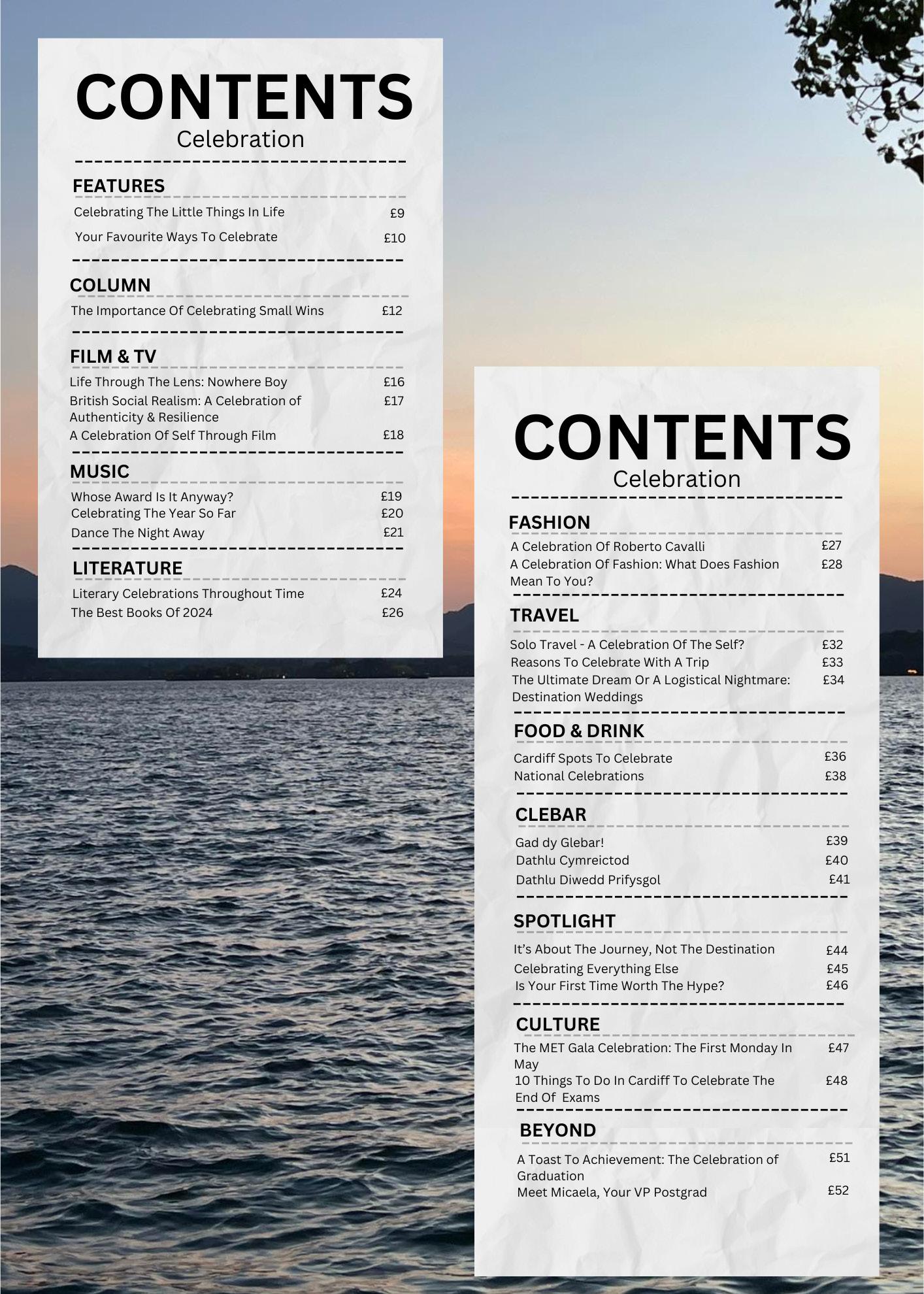

Life has always been looked at in conjunction with the milestones that have been achieved. Most of the time, we celebrate big events such as birthdays, weddings, having children and getting promotions. Sometimes, it’s important to live beyond these social boxes that have agency over our lives, slow down, and celebrate the small moments that bring us joy. Some moments go completely unnoticed due to the fast-paced mentality that most people have regarding life, and a lot of joy can be lost like this. It’s important to celebrate how long you’ve known your friends or celebrate when you’ve had a particularly good day.
Life can feel tedious and repetitive, so finding small moments of happiness can help you adopt a new way of living, one that doesn’t feel like you are just rushing to be the first one to reach the next milestone. Many things that are big parts of our lives are undermined when it comes to celebrations, and I thoroughly believe that it’s paramount to remind yourself of what’s important to you and what you value in life.
I’d much rather celebrate a good day with my friends and family, rather than commemorate a promotion. While it is nice that in our culture, we naturally celebrate people on their birthdays, that only comes once a year, and celebrations can be more frequent than that. They can be a display of gratitude rather than something that feels like a mandatory event. Life should be enjoyed, and filled with celebration and gratitude for whatever you have in life.
words by: Bhamini KhandigeIn life we remember celebrating the big things. The occasions where it feels as though the entire world has stopped to revel in the moment. We celebrate graduations, birthdays, weddings, etc. But why don’t we make more of a fuss about the smaller milestones that ultimately got us there?
Research over time has shown celebrating small achievements leads to bigger accomplishments and greater positivity in our lives. So, next time you complete that assignment that you worked so hard on getting in on time, or finish the list of jobs you left yourself, be proud. Just because it is not the most important or impressive thing you will achieve in your lifetime, there is no reason why you cannot celebrate the small things along the way.
Celebrations of the little things are invaluable, as the praise from celebration can create dopamine, which makes you feel happy. So… get that coffee, go out with friends, to reward yourself for getting through another day. Appreciate the little things that would usually go unnoticed. The effects of rewarding the little things we do can be a great stress reliever, increase our self-pride and can give you a great confidence boost to keep your motivation moving you towards your goals. We all need to normalise celebrating the smaller wins. So, slow yourself down. Focus on the present day instead of rushing onto the next big milestone, because if we don’t slow down and enjoy life, we might miss it!
words by: Ella Simmons design by: Mia Coley


My friends and family have a unique way of celebrating accomplishments, special occasions, and holidays. It all begins when we dust off our 1987 version of the board game Trivial Pursuit and pile into the living room to decide teams. Sometimes we go for the classic ‘boys versus girls,’ and other times we use some dice to randomly select team members. We quickly begin to bicker as we fight over which team my dad goes on. His encyclopaedic memory is invaluable when it comes to answering some obscure reference to a 1950s Jacque Tati film.
Once teams are decided it is not long before all dignity goes out the window. Those small multi-coloured wedges become priceless and family ties are quickly severed as the only thing that matters is winning.
A game of Trivial Pursuit in my house can last hours upon hours. This tradition has been a highlight of many Christmas days, 18th birthday parties and even the arrival of a good school report on occasion. Even though we still play the same copy we have played for nearly 20 years, the game does not lose its appeal. It has gotten to the point where we can recite the questions; the game has become less about knowing the answer and more about who has the best memory.
I specifically remember a time when I was younger, and we had just received the new Disney version of Trivial Pursuit for Christmas. The game even included a DVD, where some answers were linked to short video clips. For my sister and I, this was truly the best gift – we thought it was so advanced and futuristic we were completely ecstatic. I vividly remember the pink and blue board and the miniature Disney characters you could play with. My favourite was always Cinderella. Even though this was a game made for children it did not stop my 50-year-old uncle from reciting all the seven dwarfs’ names for a coveted wedge piece.
For context, my dad’s side of the family are the Smiths and my mum’s side of the family are the Clarks. Throughout many games of Trivial Pursuit, a saying has been developed over the years. This particular Christmas, competition was rife, and accusations of cheating were flying back and forth as the game came to a head. On this occasion the insult ‘cheating Clarks’ was uttered by my father to my mum’s cousin. Since then, we use it to tease any opposing team members who belong to the Clark clan.
It may seem odd that days of celebration in my family turn into heated debates and name calling, but this is how we show our love. A celebration is not a celebration without a classic game of Trivial Pursuit, and I would not have it any other way. I hope to carry this tradition on in my own family
but first I should probably get a more up to date version of the game.
words by: Georgiana Smith
My birthday is, in my opinion, the event of the year. For those that have watched Bridgerton, I consider myself the ‘diamond of the season’ and all the grand balls are simply celebrations of me – birthday dinners, drinks, my mum coming to visit. This makes me sound incredibly self-centred I know, but I’m the first grandchild, and only granddaughter on both sides of my family, which makes it make more sense.
My birthday is on the 17th of May, right in the middle of exams, and the third May birthday in my immediate family. Meaning, that if I don’t make a fuss about it, people might not acknowledge it. Not only do I make a massive deal of my birthday, but I have also been known to celebrate my half birthday (if the Queen can have two birthdays why can’t I?). This has been celebrated by having half a cake, getting 10th birthday cards on my 20th half birthday, and having a party with everyone willing to indulge my egotistical nature.
My 21st birthday was a manifestation of everything I had ever dreamed of for a birthday, and more. Despite being in May, the celebrations continued far into June, moving from Cardiff to my home in Surrey. The theme was pink: pink clothes, pink food, pink decorations, and best of all, a pink princess bouncy castle in the garden. My friends came from all over to attend, all having bought pink dresses to wear, my mum spent days cooking, my neighbours, cousins, and family friends were all in attendance; there was even a chocolate fountain. The jelly shots were pink, the brownies had my baby photos printed onto them, and most pedantically of all, the party ring biscuits had been hand selected to only include the pink and white ones. This birthday was so special, not only because of the tremendous effort everyone went to, to ensure it matched my Pinterest board exactly, but because it gave me the chance to relive my childhood birthday parties one last time.
I have much smaller plans for my upcoming birthday, it’s a chance to get all my best friends together and have a catch up. I’m thinking pub then club- we definitely wouldn’t fit a bouncy castle in my garden in Cathays. In fact, writing this has reminded me to make a group chat... only three weeks left for people to find me the perfect present!
words by: Hansa Tote photography by: Mia Wilson design by: Alanya Smith

When it comes to celebrations, everyone knows the big ones. Birthdays, anniversaries, new jobs, passing exams, graduations. As we pass each big milestone in our life, the Prosecco is popped, the balloons are blown up, and everyone gets together to celebrate these big achievements.
But, when was the last time you stopped and celebrated the smaller moments in life?
In today’s society, we are so used to going from one thing to the next in such quick succession - always aiming for the next best thing and working hard to reach yet another milestone. Whether it’s achieving a qualification to then get a new job, or buying a house and then getting a pet, everything we achieve opens doors to the next big opportunity. This culture of progression is ingrained within us. As we are always striving to achieve the next best thing, we can easily forget to take a moment to step back and reflect on some of life’s smaller wins.
Although it’s something we don’t often make time for, celebrating small wins in life is just as important as making time for the big ones. Don’t get me wrong, I’m not expecting
you to throw the confetti every time you go the gym, but it is important to take a moment to yourself and reflect on how far you have come. In fact, taking a moment in the day to practise gratitude and celebrate personal success is thought to immediately increase happiness levels by 10%, according to a study. And, this same study found that, in the long run, celebrating the small wins can result in a 35% reduction in symptoms of depression. So, celebrating small wins in life obviously has its benefits, and it’s something I believe that we should always do.
One of my favourite quotes is: “Remember that you once dreamed of being where you are now.” When I hear it, I instantly remember that I have come so far. When I was doing my A levels, I never would’ve thought I’d now be in my fourth year of uni. And, when I was umming and ahhing about what I wanted to do for work, I wouldn’t believe you if you told me I was now almost a fully qualified journalist. This quote acts as my reminder to remember these moments and celebrate where I am in life now.
Whether you’ve gone to the gym, fulfilled plans after wanting to stay indoors, finished an essay you’ve been procrastinating, or just finally tidied your bedroom, small wins will look different for everyone. But, no matter what they are, we need to make sure we’re celebrating them.
Itcanbehard,buthere’smytoptipstomakesureyou’regivingyourselfsomecredit onthedaysthatnooneelseis.
Comparison is the thief of joy
As I’ve said, small wins look different for everyone, so comparing your journey to others is the worst thing you can do. Everyone is on their own path in life, and everyone has their own goals to achieve. By celebrating your own small personal wins, you are taking time to be your own biggest fan. Your wins might not seem like wins to everyone, but you’re the only one that matters. If it feels like a small victory to you, it’s a cause for celebration.
Keep a diary or journal
This is a good way to remember where you started compared to where you are now. Writing down your thoughts, or even just tracking what you did each day, is a great thing to practise doing. In the present, it is a great way to clear your mind and focus on your feelings. But it’s also an amazing thing to look back on when you need a boost. I use a ‘one line a day’ journal - you sum up your day in one line, and it runs for 5 years. Each year, when I fill in the next line, I can read back on previous years and celebrate the small progress I’ve made.
Reward yourself
Thinking about and reflecting on your progress is a great thing to practise, but it can be hard to maintain. So why not physically reward yourself? Promise yourself a trip to the shops for finishing your essay, buy yourself a sweet treat to come home to after spending a day out of your comfort zone, or book to get your nails done after hitting a PB in the gym. We are wired to reward, so take a moment to treat yourself every time you experience a small win.
We know by now that everyone shows up for us during the big wins, but keep the people who are there for the small ones close by. Find friends who will encourage you the be the best version of yourself, create a circle of people who will hype you up regardless of if you’ve just got engaged or done the weekly shop. This positive circle will impact your mindset and push you to keep on achieving.
Surround yourself with the right people Rome wasn’t built in a day
Not everyday will feel like a win. Some days we will just stay in bed and procrastinate, but that’s nothing to feel bad about. Give yourself time and patience, and be kind to yourself.
And, on the days where you do achieve something, make sure you acknowledge it - it will motivate you to keep going, one step at a time.
words by: Maddie Balcombe design by: Alanya Smith



 photography by: Jiacheng Liu
photography by: Jiacheng Liu
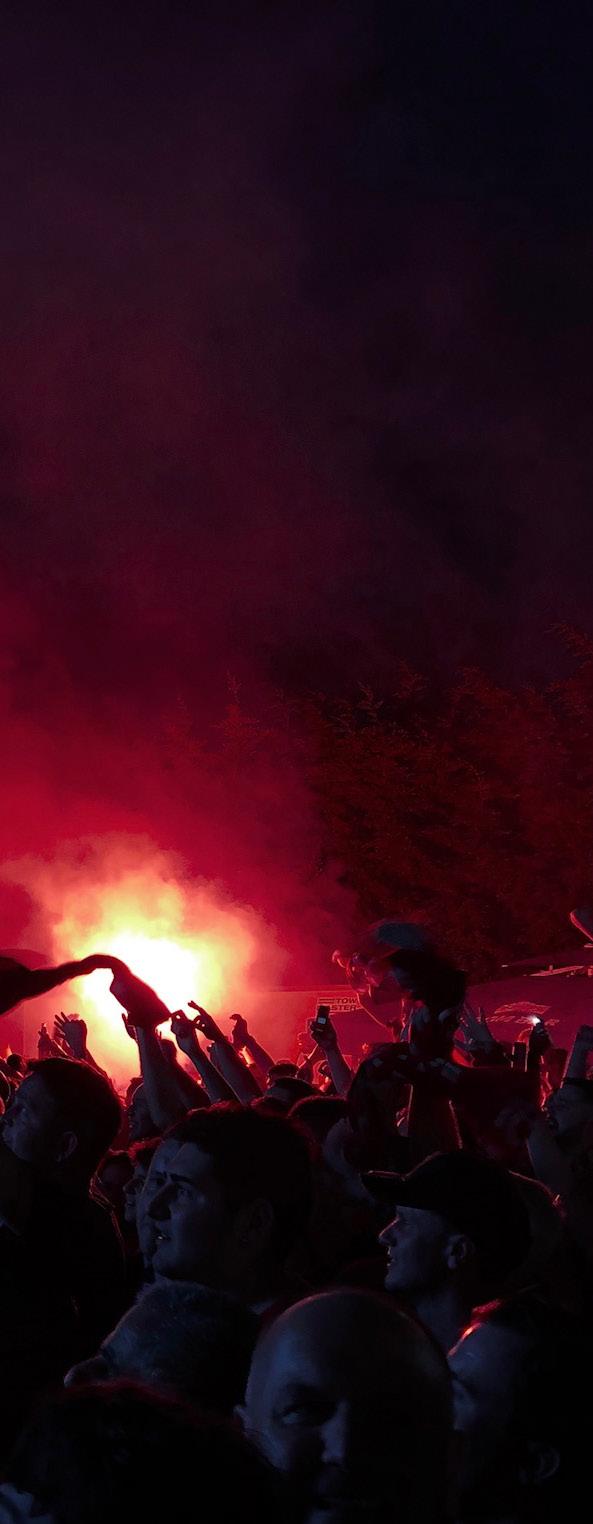
Nowhere Boy is a biopic of the life of John Lennon, from his time with the Quarrymen as they turn into the Beatles as it walks us through his struggles and how they shaped his songwriting and his relationship with the band.
Lennon is played by none other than Aaron Taylor-Johnson who can surely succeed in any role he is given, from a Marvel superhero in Avengers to the teenage heartthrob in Angus, Thongs and Perfect Snogging. In this film we see the full range of his acting, from dealing with family traumas to being the boy all the girls want – he makes clear that however influential his success, John Lennon had far from an easy life.
Perhaps the most memorable aspect of the film is the meeting of Lennon and young Paul McCartney, played by Thomas Brodie-Sangster. The film depicts the Beatles coming to life and truly celebrates the beginnings of the band, and although the film lacks much insight into the band’s music, you can take in all of the emotions and understand why the Beatles made the music they did.
Although the Beatles are central to the film, the real story is about Lennon’s relationship with his mother, Julia, and Aunt Mimi. Filled with tragedy and heartbreak, we see Lennon coming to terms with the death of his mother as he blames himself, dealing with his father leaving him, and the relationship with his aunt Mimi who protects him when there is no one else to.
The film celebrates his life by showing the audience how he has used all of the heartbreak in his life to make music and had to work hard on his relationships with the people around him after the betrayal of his mother and father.
words by: Ashley Thieme photography by: Adam Breen design by: Alanya Smith
Experience the joy of seeing your own story unfold on the silver screen. British social realism doesn’t just depict reality; it celebrates it. Through a lens of celebration, this genre has redefined British cinema, capturing the essence of everyday struggles with a raw and unfiltered perspective.
At its core, British social realism revels in breaking conventions. Emerging in the rebellious spirit of the 1950s and 60s, it echoes the sentiments of the “Angry Young Men” literary movement, challenging the status quo and giving voice to the marginalised working class. Playwrights, directors, and producers dared to defy traditional character archetypes, opting instead for authentic portrayals that resonate with audiences.
The hallmark of British grit in cinema lies in its resourcefulness. Despite tight budgets, filmmakers harness the power of reallife settings, natural lighting, and non-professional actors to breathe life into their narratives.
“By eschewing glamour in favour of authenticity, the genre invites viewers into familiar landscapes and introduces them to characters who reflect their own lived experiences.
“
Within the genre of British social realism, director Ken Loach’s masterpiece “Kes” stands as a shining example of celebration through cinematography. Set in a working-class community, the film follows the journey of Billy Casper, a young boy struggling against the odds. Despite facing adversity and abuse, Billy discovers solace and purpose through his passion for falconry. His bond with a kestrel symbolises the resilience and spirit of the working class, offering a glimpse into the untapped potential within.
Through Billy’s story, “Kes” transcends individual experiences to address broader societal issues. It sheds light on the failings of the education system and the stifling of imagination among the working class. The poignant loss of the kestrel serves as a stark reminder of the barriers to upward mobility and the consequences of societal neglect.
In celebrating individual narratives like Billy’s, social realist directors weave a tapestry of collective experience. They invite audiences to empathise with characters who embody the essence of British life, fostering a deeper understanding of societal struggles. British social realism doesn’t just observe; it celebrates the resilience, fortitude, and triumphs of ordinary people, making it a vital cornerstone of cinematic history.
words by: Tom Nicholson design by: Alanya Smith
What do we inherit from our family? Our hair colours or our facial structures; Those things are undeniable. But what is it that our family passes down to us? The things that stick. The lessons and memories shared. Those moments that you can look back on fondly.
My family is comprised entirely of artists. From singers to painters, our one (practically genetic) connection is art, in all its forms. It was the lifeline that connected us all. We each had our favourite style that we contributed to the family circle, bringing us closer together. And the new generation would always inherit a talent or interest from their ancestors.
My cousin became a singer and painter like her mother and our great aunt. I on the other hand took after my grandmother. She was never the most talented singer (although she could draw quite well), but she was a great appreciator of art, specifically cinema. She took me under her wing as her little film critic protégé. She was a lover of the golden age of Hollywood. Gene Kelly, Elizabeth Taylor, Audrey Hepburn, she loved them all.

year-old self to teach her proper pronunciation of the lines and songs from her favourite movies. Her favourite movie was Singin’ in the Rain. I remember every time I would fly to Brazil to visit and be stuck with horrible jetlag, she would stay up with me and put on Singin’ in the Rain.
That movie holds a near and dear place in my heart. I forever consider Singin’ in the Rain my favourite movie because of the special memories and attachment it has to my grandmother. She gave me the love for cinema that she got from her mother, who named my great aunt Vivian as inspired by Gone with the Wind. Three generations of cinematic appreciation will continue to live on.
My grandmother, now suffering from dementia, struggles to recognise her daughters at times, but you put on an old Hollywood film, and she lights up. It’s like a part deep down inside of her that loves it without having to recognize it. Movies are more than actors and stories; they bring families together and transcend generations.
Her limited English meant she often asked my seven-
words by: Carolina Domingues design by: Alanya Smith
Have you ever clicked on a news headline, citing the announcement of nominees for an upcoming music awards ceremony, and not recognised a single person on that list? Or, have you noticed that every list seems to include the same rotation of artists, whether it be for a Grammy, BRIT or MTV award? If so, you’ll be pleased to know that you aren’t just living under a rock, or out of date with recent pop culture – the majority of us agree that this is a universal experience.
Earlier this year, the Brit Awards came under fire for its controversial list of award nominees for its 2024 edition of honours. Social media comment sections were flooded with furious stans, demanding recognition for their hardworking favourite musicians. My X (Formerly Twitter) feed was packed full of questioning onlookers: are we all really this old? Are these industry plants? Who on earth is Cleo Sol and WHO on earth is listening to Ed Sheeran in the year 2024?
Many of the complaints were pathetic – hardworking individuals such as the aforementioned Cleo Sol, RAYE and Jorja Smith were dubbed unworthy of their nominations due to their anonymity to the public eye. However, in a hypocritical turn of events, the public equally shunned the awards for their ever-recurring, prominent figures – Taylor Swift, Dua Lipa, Calvin Harris. The uproar sparked the question in my mind: just who are these awards for?
The general consensus is that award nominations must directly represent the current popularities and favourites of the people. It must be noted, however, that it isn’t 34-yearold Janice from Slough walking up on stage and accepting an award on Becky Hill’s behalf. This year’s Brit Awards were, for me, an improvement from the year before, which was criticised and accused of misogyny following the glaring lack of women in its Artist of the Year and International Artist of the Year categories. Not only were we blessed with fresh faces, but established artists with careers spanning multiple decades were getting their chance at recognition. The 2024 Brits included the likes of Paramore, Jessie Ware, Blur, and Foo Fighters – none of whom are regulars on Heart or Capital FM.
The Grammys, however, were a little more mainstream. Earning nominations this year were big names such as Miley Cyrus, Taylor Swift, and Billie Eilish, all of whom, despite being incredibly talented and hardworking individuals, were also blessed with the advantage of a large listener base and legacy. I’m not here to bash any individual artists or songs, and the following song is definitely still a banger, but I’d put up a fight that Record of the Year being won by Miley’s ‘Flowers’ and not boygenius’ ‘Not Strong Enough’ was largely due to its radio attention and not the lyricism or production of the song.
This leads into my main qualm with these awards – is it talentbased, or is it popularity-based? What wins these awards? Surely, if it were the latter, the public would be given more of an input as to who and what gets nominated, resulting in a clearer representation of the music industry’s current climate. But, if we were to go down that route, the world’s most beloved artists (with the craziest fanbases – you know the ones) would be snatching up every opportunity for newer artists to get anywhere, and eating their dinner out of golden trophies. Even the most internationally renowned artists had to start somewhere – Billie Eilish didn’t blow up overnight; in fact it wasn’t until years after posting ‘Ocean Eyes’ on SoundCloud that she got her deserved success. Katy Perry turned down an offer to collab with ‘just some blonde girl’ on a ‘boring’ song, only to have been surpassed in monthly listeners on Spotify by her within the decade that followed.
Truthfully, I believe that if you base a musician’s work or worth on a yearly list, your ears will be sentenced to a lifetime of mediocracy and never actually develop a fully-fledged taste. Listen to what you love, and don’t listen to the opinions of the elite industry men (or a bald guy on YouTube). I should know, I’ve been an emo since I was 8. And as Fall Out Boy, the decade-old yet still recently underappreciated band said in their recent album: “I guess I’m getting bolder ‘cause I’m less pissed/ We didn’t make it to your year-end best list/ Not the end of the world.”
Because it truly isn’t.
words by: Tegan Davies design by: Mia Coley



Taylor Swift’s latest release The Tortured Poet’s Department is already breaking the charts. Her anticipated eleventh studio album is already all top ten spots of the Billboard Hot 100 and has been named Billboard’s number one album, with 2.61 million units sold in the first week of the release.
The total thirty-one songs take us through Swift’s twohour autobiographical journey of love and loss. Her storytelling talent in her latest album has made history by having the largest streaming week for any artist in history (891.37 million streams) as she achieves higher than ever imaginable with every new release.
The Tortured Poets Department has become a quick phenomenon since its release as it becomes a fan favourite. The songs have become extremely popular on social media amongst the “Swiftie” fandom, who critically analyse and theorise about them. It is the honesty of the album that has left fans feeling more connected to Taylor than ever, with candid lyrics that tell us the vulnerable inner thoughts of the chairman of the ‘Tortured PoetsDepartment’.
It is clear to see the album is going to be known as one of Swift’s classics as it takes the music release spotlight so far this year.
words by: Ella SimonsPost-Punk’s Not Dead!
In fact, I’d go as far as to say it’s thriving. 2024 promises to be a year of exciting new releases; Fontaines D.C.’s latest single, ‘Starburster’ is yet another showcase of the group’s impressive diversity of sound. After time devoted to solo projects (lead singer Grian Chatten has spent time with Ireland’s own KNEECAP, as well as releasing his debut solo album), the band have reunited with a totally new sound which falls somewhere between metal, rap and a panic attack. It comes ahead of their next album, Romance, which is set for release in August this year.
Another group which have really excited me this year are Lime Garden. I’ve been anticipating a full LP since around 2020, but the wait has been worth it. In One More Thing,
the snappy rhythms and deft lyricism that have characterised their previous releases have been woven together to create a tapestry of sound which is erratic and lush in equal parts. It’s infused with the sound of some of the more discoadjacent post-punk of the early 80s, but lyrically they remain firmly rooted in the modern day, making the album a pleasant antidote to some of the more depressing elements of life today.
words by: Polly BrewsterChappell Roan, Olivia Rodrigo And Sabrina Carpenter: A Good Year For Pop
2024 has been an iconic year for music, especially with the revival by female pop musicians. From pop punk to queer influences, the pop music scene has certainly not been underwhelming.
Some of my favourite releases from this year have to be from Chappell Roan, Olivia Rodrigo, and Sabrina Carpenter. These three American idols have charted countless times in recent years, and their 2024 releases are no different. From their catchy lyricism to sold out global tours, it’s no wonder they’ve been on everyone’s Spotify playlists.
So, which songs of theirs have been on my repeat playlist? Well, to begin with, Chappell Roan’s ‘Good Luck, Babe!’. Since November I haven’t been able to stop listening to Roan’s entire discography, so when her new single hit streaming platforms in April, I was sure to absorb every lyric into my bloodstream.
Secondly, ‘Obsessed’ by Olivia Rodrigo. Now, Rodrigo is no ‘stranger’ (extra points to you if you know the song reference) to tapping into every young woman’s slightly crazy thought, which is why ‘Obsessed’ is the perfect song to fuel your obsessions.
Lastly, we have Sabrina Carpenter’s ‘Espresso’ with ear worm lyrics and an upbeat tune, this song will be my personal Summer anthem this year.
words by: Kath Witts design by: Alanya Smith
We asked our contributors for the songs which made them want to celebrate - their ultimate floor-fillers.
‘Voulez-Vous’ by Abba
I feel as though this may be a popular or even basic choice for my favourite party song of all time, but it’s going to have to be ABBA’s 1979 ‘VoulezVous’. I don’t know whether this stems from my life-long obsession with the Mamma Mia films or whether every person on the club dance floor, without hesitation, will know the entire song.
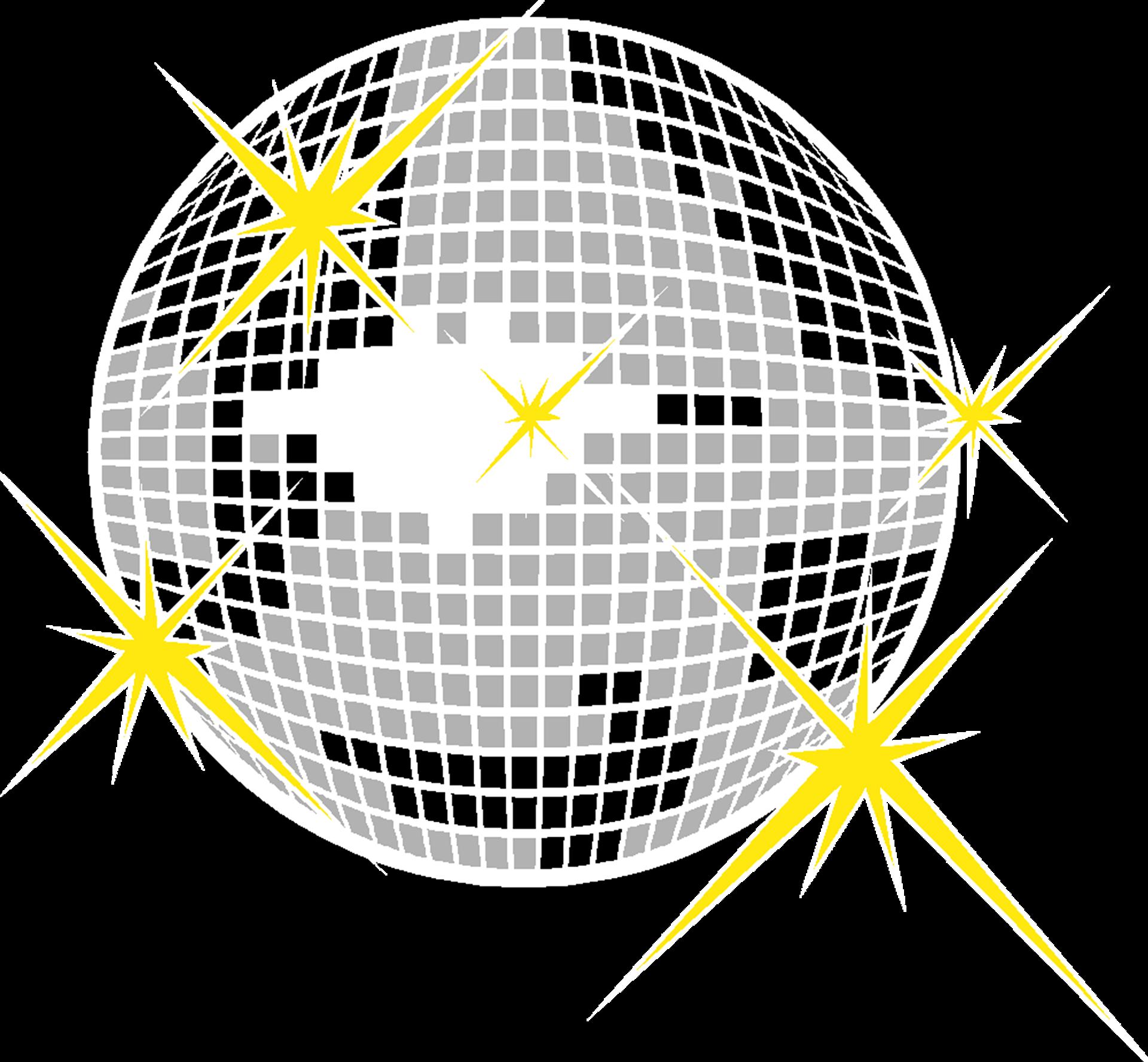
‘Here’s The Thing’ by Sports Team
Not only is it loved worldwide, but I feel like it perfectly conveys the feeling of dancing the night away with your girlfriends on holiday somewhere hot! Again, I am unsure whether it manages to convey this feeling because of the iconic dance scene that it is paired with in the Mamma Mia film, but who cares, why wouldn’t I want to look and feel like Sophie Sheridan?
Wordsby Mia
WilsonMy favourite ‘floor-filler’ of all time was the (then newly-released) song ‘Here’s The Thing’ by Sports Team. This song gave and still gives me so much joy and happiness, with its simultaneous danceability and angst. However, the top floor of Clwb Ifor Bach did not agree with me one fateful Saturday night, with it proving a floor-clearer instead! I think to me a floor-filler is just what brings me delight - so you can keep your ‘Mr Brightside’ and ‘Not Nineteen Forever’, I’ll enjoy my time dancing my heart out on an empty floor with all of my best friends (even it if means I’m barred from making requests!).
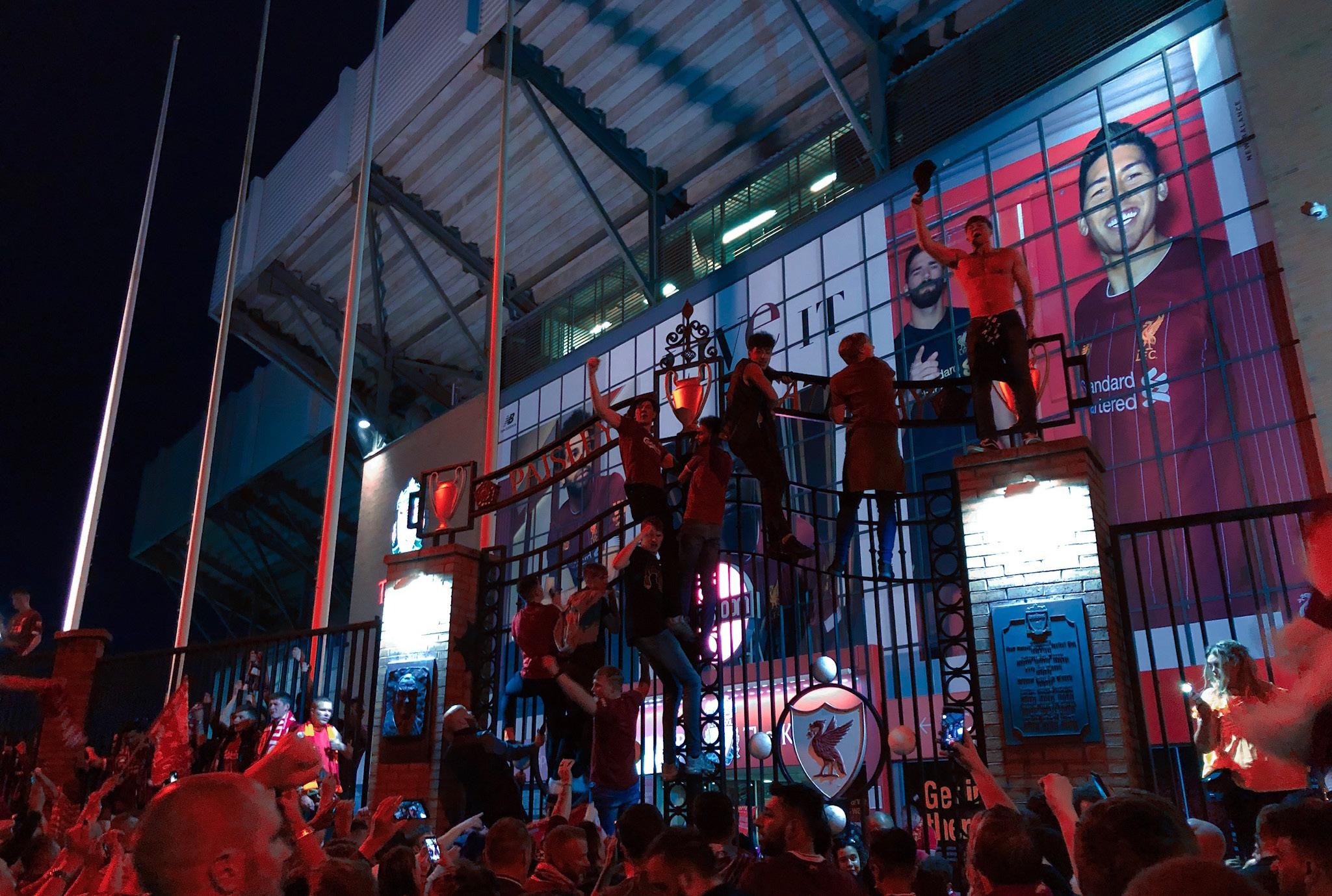
 photography by: Adam Breen
photography by: Adam Breen

Humans have taken every opportunity to celebrate for thousands of years. It is ingrained in our very nature, whether we are popping a bottle of champagne with friends and family or gathering around a fire to welcome springtime. This desire to celebrate has naturally woven its way into our storytelling. Our literature reflects these cultural practices that have been present throughout time, from the ancient parties of the Roman Empire to the tantalizing excess of the Jazz Age. Writers have used celebration as a literary device to drive plots and to depict the intoxicating allure of a good party.
Literature has been intertwined with mythology and religion for many millennia. The ancient Greeks celebrated Dionysia, which was a festival in honour of Dionysus, the god of good wine, fertility, and theatre. This festival was crucial in the development of Greek theatre, as playwrights incorporated the celebration into their works, exploring themes related to it. For example, Euripides, a writer of tragedies, explored the dark side of humanity. His play ‘The Bacchae’, written in the late 5th century BC, centres on the god Dionysus’ arrival in Greece. The play is a complex exploration of the consequences when a society suppresses divine influence.
Roman celebrations also influenced literature at the time, The Bacchanalia, which were religious festivals held in honour of Bacchus, who was the Roman equivalent of the Greek Dionysus, became celebrations of pure subversion. One could attend and shed one’s class, sex, and culture in order to commit to the ecstasy of freedom, They were essentially days-long parties overflowing with booze, sex, and music. Both ‘The Bacchae’ and the Bacchanalia reflect the tension between societal norms and the forces of unrestrained nature and human behaviour, symbolised by the worship of Dionysus and Bacchus. The balance between suppressing instinct and embracing chaos was a central theme to the many writers who attended these celebrations.
As time went on, the act of celebration continued to play a large role in literature. In medieval society, celebrations often reinforced social hierarchies. Envision a large feast, crowded tournament, or lavish party. Who do you imagine throwing the opulent celebration? Likely, images of old noblemen come to mind. Nobility used celebration to flaunt their wealth, generosity, and power. Yet, literary tales tended to subvert this narrative, opting to utilize celebration as a platform to allow characters to step outside social roles. For example, in ‘The Canterbury Tales’ by Chaucer, the charter of the Miller represents the lower class, behaving in a deceitful way. Yet, he narrates the most complex parts of literature, critiquing those around him who would typically dismiss him as crude.
Continuing this theme, Renaissance writers used celebrations to advance plots and facilitate resolution. Many of William
Shakespeare’s plays use festivities towards the end of the story to resolve the conflicts. For example, ‘A Midsummer Night’s Dream’ culminates in a triple wedding that resolves the romantic conflicts of the piece. Shakespeare employs this in ‘Twelfth Night’, where harmony is restored during an ending that is bathed in the spirt of festivity and indulgent characteristics of the ‘Twelfth Night’ holiday, which marks the end of the Christmas season. Societal norms are reinstated in the conclusion. The theme of festivity and celebration is regularly employed as a means to step outside these rigid norms, yet it also ensures their return to normalcy once the ‘party’ is over.
As literature evolved, writers like Jane Austen began using social gatherings to advance their plots. Grand parties and luxurious balls, provided the perfect backdrop to explore social interactions. Austen’s novels were full to the brim with stolen glances across the ballroom floor, hands subtly grazing against one another, and strained emotion. In Pride and Prejudice, the Meryton Ball is where Elizabeth Bennet first encounters Mr. Darcy, and his initial refusal to dance with her sets up the tension between the characters, which drives the rest of the plot. The interactions at these gatherings are bounded by strict rules of conduct, which both constrain and define her characters’ behaviour. There is also a class element in Austen’s works; the gatherings allow social classes to mux that would not normally engage with one another, exemplified by Mr. Darcy’s interaction with Elizabeth, who is of a lower status.
Celebrations also drove the plot for many authors, including F. Scott Fitzgerald. His work, ‘The Great Gatsby’, utilized celebrations as a character in itself. Fitzgerald’s life was marked by the excessive celebration of the Jazz Age. The end of World War I brought about significant societal chances as the strict morality and social norms of the past were replaced by extravagant lifestyles. In ‘The Great Gatsby’, Jay Gatsby’s extraordinary parties intoxicate the narrator, Nick Carraway. He is plunged into the excessive opulence of Gatsby’s world, which similarly draws the readers into his life. However, not all is as it seems; Gatsby’s parties are merely a superficial ploy to catch the attention of Daisy Buchanan, his lost love. The lavish parties underscore the isolation he feels can be overcome by wealth and statues. Ultimately, it is not enough, and Gatsby succumbs to his fate at the very location where he once held these parties.
Throughout time, celebrations has been at the core of human experience, and this has been clearly reflected in literature we create. These themes will likely continue to be a part of literature for centuries to come.
words by: Georgiana Smith design by: Alanya Smith

 Design by Mia Wilson
Design by Mia Wilson
In the vibrant tapestry of fashion history, one name that shines with unparalleled brilliance is Roberto Cavalli.
Renowned for his daring designs, intricate prints and innovative techniques; Cavalli revolutionised the fashion industry. From humble beginnings to global acclaim, his journey is a testament to flamboyance, perseverance and an unyielding passion for creativity.
Cavalli was born in 1940 in Florence, Italy. A city steeped in artistic tradition, his early exposure to the rich cultural heritage of Florence would later serve as a source of inspiration for his designs.
After studying Art at the Academy of Fine Arts in Florence, Cavalli embarked on a career that would see him become one of the most influential figures in contemporary fashion.
In the 1970s, Cavalli burst onto the fashion scene with his ground-breaking invention: printed leather. This pioneering technique, which involves printing bold and vivid designs directly onto leather, set him apart from his contemporaries and earned him widespread acclaim. It wasn’t long before his creations caught the attention of the fashion elites, catapulting him to international fame.
Throughout the 1980s and 1990s, Cavalli continued to push the boundaries of fashion with his daring designs and fearless use of colour and texture. His signature style - characterised by exotic animal prints, bold fabrics and a sense of unabashed glamour - captivated audiences around the world. His first celebrity ambassador, the French model and actress Bridget Bardot, is often credited with thrusting the brand into the mainstream fashion scene. But powerfully sexy women like Kate Moss, Gisele Bundchen, Sharon Stone, and Jennifer Lopez have followed as ambassadors since – cementing Cavalli’s status as a fashion icon.
One of Cavalli’s most enduring legacies is his contribution to the concept of ‘luxury bohemianism’. Drawing inspiration from the natural world, he blended elements of different cultures and traditions to create a style that was at once exotic and elegant. His bohemian-chic aesthetic resonated with a generation of free spirits, inspiring a global movement towards eclectic and individualistic fashion.
In a 2011 interview with Vogue Magazine, Cavalli explained the inspiration behind his designs:
“It’s not really that I love to use animal print, I like everything that is of nature; anything natural that is around me. I started with flowers, in the beginning it was orchids; I enjoyed seeing the movement - and it’s so white. It’s sexy also. I play a lot with my small camera, and I started to appreciate that even fish have a fantastic coloured “dress”, so does the snake, and the tiger. I started to understand that God is really the best designer, so I started to copy God.”
Despite his towering achievements, Cavalli remained refreshingly down-to-earth. He was known for his warmth, charm and infectious enthusiasm for life. He was incredibly dedicated to his craft and had a keen eye for detail and was deeply involved in every aspect of his fashion empire, from designing to business analytics.
In 2019, Cavalli retired from his eponymous label, marking the end of an era in fashion history. The Italian fashion designer passed away aged 83 on 12th April 2024—however, his legacy lives on, immortalised in the timeless beauty of his creations. Roberto Cavalli may have bid farewell to the runway but his influence continues to reverberate through the world of fashion, reminding us all of the transformative power of art and creativity.
Words by: Olivia GriffinAs a university student, without the confines of a uniform, fashion serves as an ever-evolving canvas of expression. Whilst dabbling with various styles, influenced by trends, peers and pop culture; clothes act as a way to express my inner self, a platform for authenticity.
For me, fashion also embodies the excitement of anticipated events and special occasions - half of the thrill comes from meticulously planning my outfits! I envision myself: what will I wear to graduation that whispers ‘I did it!’? Or to sing and dance the night away at a Taylor Swift concert. What outfits will I pack to take on holiday this summer? What’s the perfect interview attire for those post-grad job interviews? Ultimately, fashion isn’t just about what I wear - it’s about the stories waiting to be told in each outfit, a celebration of the adventures yet to come. Each item in my wardrobe holds precious memories, evoking feelings of nostalgia.
Style also celebrates a kaleidoscope of diversity and creativity. It’s a language spoken through bold colours, unique silhouettes and statement pieces. A journey of self-discovery, much like the one I’m about to complete at university, I eagerly await to see where my style will take me next.
words by: Imogen Edmonds
Since I was a child, fashion has always been a strong part of my life. Dreams of wanting to be a fashion designer, a model, a stylist, or anything to get access into that magical world.
To me, fashion is about the freedom to express your emotions and experiences, or even your identity and interests. My wardrobe is almost like a diary that holds different eras of myself, different phases, obsessions - I would never be able to define it as one thing. That’s the beauty of fashion, it gives you an individual identity. From the first top I ever thrifted to a pair of earrings I stole from my Mum, each piece is attached to a memory, its own purpose in my life. That’s what I love so much about fashion and the industry, everyone has a story to tell, and I’ve always wanted to be part of that.
I celebrate how my relationship with fashion has developed, from learning to accept individuality and draw my own inspirations to cultivating a personal style. In the future, I hope to make my inner child proud by working in the fashion industry, so I can immerse myself in that magical world forever.
words by: Angelina MableFashion, to me, used to be about following trends. Now, living on a student budget and attempting to shop second-hand, fashion looks completely different.
Social media has made it completely impossible to be on trend, what’s ‘in’ is dependent on who you follow. In my opinion, this is an exciting opportunity to make fashion entirely about personal expression! With the pressure of following mainstream trends gone, I have found myself experimenting with colours and silhouettes I would never have had the confidence to wear before. This is not to say I never buy into trends, but I try to only follow those I like.
Recently I have learned a lot about sustainability in the fashion industry, so I have been trying to shop second-hand. Yet another excuse for experimentation; shopping second-hand gives you the chance to find unique pieces to add to your wardrobe. It can also be a hobby! Scrolling through Vinted, finding new ways to repurpose clothing, and learning to upcycle are all ways to celebrate and enjoy fashion. Trying to shop more consciously (not to mention on a budget) has given me a new appreciation for the clothes I have, and my relationship with fashion is gradually evolving from following trends to - attempting - to create a personal style.
words by: Hannah Fielder design by: Alicia YapI can’t begin to describe my relationship with fashion. It’s one full of enthusiasm and excitement over planning outfits for specific events, but also an innate sense of wanting ‘the next best thing’ and wanting to be accepted. We love to evere fashion, stating how it’s an expression of ourselves and makes us feel good – but what about the people that dread going shopping or getting dressed in the morning because they feel their clothes aren’t good enough. Fashion, to me, means complicated. It’s an intricate industry riddled with profit from insecurity and elitism, yet I still want to be part of it.
Why?
Fashion, to me, should mean accessible. It should mean expression, silliness, coolness, even confidence. Yet there are people out there who don’t feel this way towards it, and that is because the industry excludes the very people it means to profit from. Fashion, to me, should include everyone – despite their shape, size, race, or pronouns. I believe fashion should be a concept that everyone can partake in. I struggle to think of people who don’t feel positively about the clothes they wear, but I know there are. Working in the industry would mean a lot to me, as I want to represent the people who love fashion but don’t necessarily get the opportunity to express it in fear of ridicule or embarrassment. Inclusion is what fashion means to me, and I hope I get the opportunity to embrace this.
words by: Bethan Gwynne photography by: Adam Breen
photography by: Adam Breen

 photography by: Jiacheng Liu
photography by: Jiacheng Liu

Solo travel sounds so daunting, everyone who I told I went halfway around the world by myself at 18 says something along the lines of ‘I could never’. But I think you could after you have a small cry in Heathrow Terminal 5.
Travelling alone offers a unique opportunity for personal growth, self-discovery, and empowerment. You realise you’re much more capable than you previously thought. My first night on my own I found a group of girls at the hostel I was staying in, and we were going to a restaurant. It was a well-recommended one, but we ended up walking out of town, being yelled at by men and getting lost near a river. I can remember so clearly having the thought if Dad was here, he could get me out of this situation. But the lovely lady who owned the restaurant sent her sons to find us and we ended up getting a moped escort instead of a grizzly ending. Travelling by yourself shows you how resilient you actually can be.
Now I bet when you’ve been somewhere with friends and one wants to go to the beach, one wants to go on a hike and the other is begging for a night out. What if I told you when you’re by yourself, none of this happens? You don’t have to compromise anything. From choosing the destination to planning the itinerary, every decision is yours to make. Whether it’s exploring ancient ruins, hiking for a sunrise, or immersing yourself in a vibrant local culture. It’s all about you, when else would you get that opportunity?
Solo travel offers a precious opportunity for self-reflection and introspection. Removed from the distractions and responsibilities of everyday life, you have the space and solitude to reconnect with yourself on a deeper level. Everyone talks about how scary it is to eat alone, but I have a method for this. You need to give yourself a character, someone brave, who does this all the time and then when anyone comes up to you, you are that person. It makes it all much less scary, and once you’re confident enough you can be yourself. You are the brave person who goes out to dinner by yourself.
If you haven’t gotten my opinion by now, I think solo travel is one of the best things you can do for yourself and you’ll discover so much more about who you are and what you can do.
design by: Alicia Yap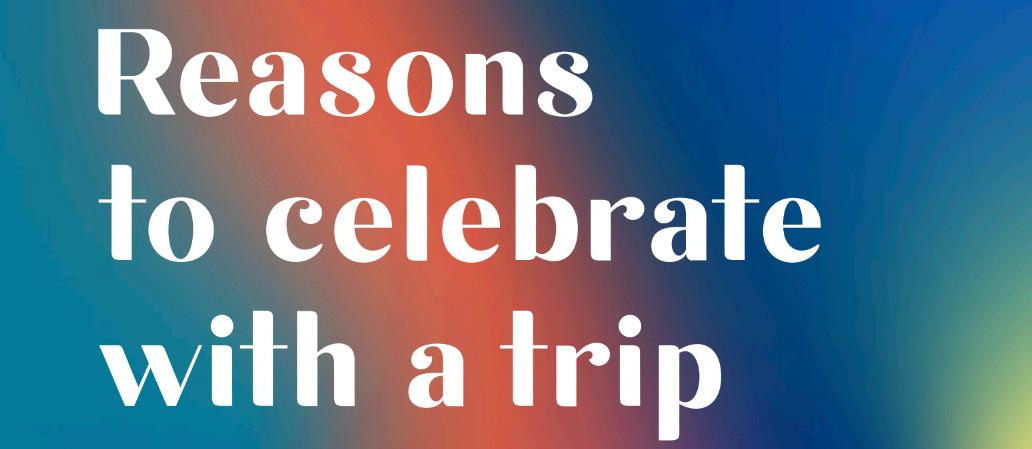
In my eyes, there is no better way to commemorate a celebratory occasion than with a trip. Along with the pleasures of hand-made or ‘experience’ gifts, a trip away can make an occasion much more momentous, and when it’s gifted, a lot more personal. Not only that, but it also extends the celebrations for longer than necessary – something I’m particularly fond of as someone who prefers their birthday to last a whole month, rather than the one measly day it’s subject to (which let’s be real, is never as good as you anticipate it to be). My uncle and auntie generously offered to take me on a trip to Dublin for my birthday this year. With promises of being treated to a full Irish breakfast, authentic pints of Guinness and the chance to explore a new city – how could I say no? Having only gone for thex weekend, it was the perfect opportunity to take a break from our busy schedules and focus on the element of celebration. While my birthday wasn’t exactly a milestone this year, the trip certainly made it feel like it – and that’s something I can get behind.
words by: Hannah Wild
Little moments, equal little wins. Celebrating the little things, and every day with a little day trip is often forgotten in the manic world we live in today. It is so easy to forget to take a proper break from the stress of daily life, and not just a coffee date, but a whole day booked out of the diary for some real “me” time. One day might not be a lot, but it’s not as expensive as a full holiday and allows you to keep on track with the overwhelming workload. The premise of “one day” also sets a challenge of visiting somewhere within 24 hours, and therefore celebrating the wonders of England. Coming from the countryside myself, I love taking a stereotypical day out to London. The checklist includes a scramble around the underground, a classic visit to a major landmark, an inevitable moment getting lost, a classic sandwich from M&S, and most importantly, a visit to Ottolenghi’s delis to ogle at the cakes on display. It’s a breeze of a day in comparison to the tornado of life, and it celebrates the little wins of life because that’s something we all forget to do.
words by: Ellen Hollingshurst design by: Mia Coley
Destination weddings can be the ultimate celebration. What better way is there to celebrate the union of two people than an intimate gathering in a glamorous destination, with the people they are closest to? From helping a couple save money on an expensive UK wedding, which is especially important during the current housing crisis, to enjoying a tropical fantasy, a destination wedding might be just the ticket. On the other hand, there is a different angle to the
For instance, my aunt had a destination wedding in Barbados when I was 3 This may sound like the ultimate dream, but with two young children, my mum (a nontraveller) wasn’t in the position to travel across the world for her own sisters’ wedding. However, it proved that the ultimate solution was to host a huge wedding party in the UK so that friends and family that couldn’t make it to the Barbados wedding could be included Ultimately, this destination-wedding-celebration-and-UK-party combo might be the perfect mix.
idea of jetting off for such an important celebration which may discount the option for many people. There are many reasons why a destination wedding might just not work.
A destination wedding has the potential to be some people’s worst nightmare. This is especially worrying in the circumstance that loved ones can’t make it to the far-off destination for any number of reasons. Firstly, some people may consider it entitled of the to-be-weds to expect them to pay for the travel and accommodation to the event, or simply struggle to make it world. Equally, a sick family member could face challenges travelling so far. This could shine the light away from the celebration of the wedding itself, yet there are ways to find a balance.





Cardiff is a city known for its beautiful restaurants, cafes and bars; full of options around every corner. Cardiff’s dynamic city centre is rife with vibrant places for eating and drinking out, perfect for any occasion. But with so much choice, where is the best place to start?
Here are some of my top picks for eating and drinking out in Cardiff city centre:
Cafes:
Scaredy Cats, Maple and Bean, Uncommon Ground
Restaurants:
Fat Hippo, Turtle Bay, Chai Street
Bars:
Porters Jazz Bar, Live Lounge, Ballie Ballerson
In this list I have to single out and sing the praises of Live Lounge, a student favourite for very good reason. With a ‘lively’ atmosphere and exceptional local bands offering live music everyday from midday until midnight, it offers the perfect atmosphere for groups who enjoy a sing-along and a dance any day of the week.
It is fair to say that the Welsh capital is the perfect spot for a great night out with an amazing range of restaurants, bars and cafes where there is something for everyone to try. So, whether this list has a trusty favourite or somewhere that could take your fancy, enjoy the best of Cardiff’s hidden (and not so hidden) gems.
Words by Ella SimonsWally’s Delicatessen & Kaffeehaus: This lesser known deli, is one of my favourites in Cardiff as a low-key, quiet café. Located in the Royal Arcade, opposite Lucy & Yak, this little shop of heaven is perfect for anyone seeking a unique gift for a foody friend, with their deli stocked floor to ceiling with food from around the world there is something for everyone.
If you can peel yourselves away from the chocolate counter or the ice cream stall and wonder upstairs, you will find one of my favourite cafes. Only seating a maximum of 30, this one room Kaffeehaus is based off the Viennese coffee house culture and offers a range of delectable open sandwiches, grazing platters amazing cakes and patisseries plus Italian gelato. With reasonable prices, and a student discount on offer I could not recommend this place more for a cwtchy date, or a peaceful study - and you just know the place is going to be good as well when they provide a biscoff biscuit with every hot drink you order. I personally love going for a slice of toasted panettone, slathered with some butter, but whatever you choose, the place is sure to deliver many Instagram worthy shots.
Potato Day: It’s about time we celebrate the potato. I believe 19th of August should be more prominent on everyone’s calendar, National Potato Day. And these are my reasons why we should celebrate the potato more. It’s the most versatile carb, chips, crisps, hash browns, jacket, mash, dauphinois, the list goes on and on and on. There is a potato for every occasion. Studying? Crisps. Comfort? Mash. Night-out? Chips. Why would you need anything else in life that’s not potatoes? Now this could be my Irish grandparents talking through me but the potato is the real MVP and we should all respect it so much more.
words by: Poppy Adams
Ice Cream Day: The clock strikes 12:00 on the third Sunday of July, and the country enters a lesser known period of Ice Cream Day. Yes, it’s a bit childish, but I shall be championing this day in its glory, embracing the childhood dreams for towering knickerbock- er glories and brownie, caramel, and ice cream combos that are honest- ly too good to even exist. So, will you join me eyeing up the flavours at the ice cream counter and coming up with the weirdest combina- tions possible? Be warned I have tried mango sorbet and mint chocchip. Verdict? Surprisingly ok.
words by: Ellen Hollingshurst
Cheese Day: One of the best days of the year falls on June 4th ,as one of the most versatile foods is appreciated throughout the world. Possessing a plethora of forms, cheese is the perfect addition to any meal and adds so much to the most basic of snacks. Most celebratory events are not complete without a cheeseboard and a perfectly cooked camembert. What other food pairs so perfectly with wine, and is able to be eaten at any opportunity. Besides, it’s the only food that is recognized by McDonalds as needing to be appreciated in all forms, with the different cheese bites causing na- tionwide discussion over the best variation. parents talking through me but the potato is the real MVP and we should all respect it so much more.
words by: Poppy Adams design by: Alicia Yap
Am y tro olaf yn y flwyddyn yma, dyma Steff Thomas sydd am cau ei glebar…
1. Beth yw dy enw? Steffan Thomas
2. Beth mae dy ffrindiau yn dy alw di? Chapo
3. O ble wyt ti’n dod? Llandybie
4. Tri gair i ddisgrifio dy hun?
Tall, dark and handsome
5. Pa gwrs wyt ti’n ei hastudio ac ym mha flwyddyn wyt ti?
Yn ail blwyddyn yn neud Electrical Engineering
6. Ble byddwn ni’n debygol o ddod o hyd i ti ar nos Sadwrn?
Clwb ifor bach
7. Beth yw dy ‘hangover cure’?
Massive legs session yn gym a mynd i sauna
8. Hoff beth am caerdydd? “Ffrindiau coleg ffrindiau oes” ~ Pie 2k23
9. Beth yw dy ‘go to drink’ ar nosweth allan?
Vodka lemonade and lime
10. Hoff beth am fod yn gymro/Cymraes?
Bod efor gallu i siarad iaith y nefoedd
11. Beth yw un arferiad gwael sydd gennyt ti?
Siarad i mwy na un merch ar yr un tro #playaaa
12. ’Tip’ byddech chi’n rhoi i fyfywiwr blwyddyn gyntaf?
Ewch yn wyllt
13. Beth yw un cyfrinach sydd gennyt ti?
Bydd e ddim yn cyfrinach os o nin gweud na!
14. Hoff gân?
Brwydyr Dawel @mari fychan


Heb os nac oni bai un nodwedd sy’n rhan annatod o fy hun ydy fy Nghymreictod. Un o’r ffyrdd dwi’n dathlu fy Nghymreictod ydy mynychu’r Eisteddfod Genedlaethol. Dyma gyfle i weld wynebau hen a newydd a chreu atgofion newydd. Llynedd mi wnes i golli’r un cyntaf ers tua 10 mlynedd oherwydd roeddwn i’n gweithio mewn camp yn America. Felly dwi mor gyffrous i fod nôl ar y maes eleni. Ers yn ifanc dwi wedi bod yn mynd i garafanio ar faes yr Eisteddfod. Wedyn pan roeddwn i’n 16 oed roedd modd mynychu Maes B. Dyma le mae artistiaid gorau’r sin gerddoriaeth Cymraeg yn arddangos eu doniau. Yn sicr, mae gwrando ar gerddoriaeth Cymraeg yn un o’r ffyrdd dwi’n ymfalchïo yn yr iaith.
Dwi hefyd yn mwynhau adeg y chwe gwlad ym mis Chwefror sy’n brofiad anhygoel o gerdded lawr stryd Santes Fair a gweld pobl wedi gwisgo ac yn cefnogi eu gwledydd yn frwd... er bod Cymru heb wneud yn dda iawn eleni!
Yn ogystal, dwi’n hoffi bod Cymru yn profi pob tymor. Er mor llwyd mae’r gaeaf mae’r awel ar ddiwrnod braf yn werth yr aros. Dwi’n edrych ymlaen at orwedd ym mharc Biwt a cherdded i’r bae.
Un o’r ffyrdd eraill sy’n ddigon syml ydy sicrhau fod y Gymraeg yn rhan o fy mywyd bob dydd, sydd braidd yn anochel wrth i mi astudio’r Gymraeg yn rhan o fy ngradd ac yn byw gyda fy ffrindiau sydd hefyd yn ddwli ar siarad Cymraeg. Dwi hefyd yn rhan o’r GymGym ac yn edrych ymlaen at wythnos lawn dathlu yn Wythnos GymGym ar ddiwedd mis Mehefin!
ysgrifenwyd gan: Beca Dalis
Un peth sydd yn hanfodol i mi wrth ddathlu fy Nghymreictod yw mynychu gemau Pêl-droed Cymru. Wrth i gan Dafydd Iwan ddod yn anthem i’r gêm pêl-droed cenedlaethol Cymraeg, mae’r dorf wedi dod yn lle hanfodol i fod wrth
ddathlu Cymreictod. Mae’r FAW wedi gosod pob ymdrech i fod yn rhan annatod o Gymru a’r hunaniaeth ac wedi llwyddo i greu undod rhwng y cefnogwyr Cymraeg a di-gymraeg wrth gefnogi’r un nod a thîm.
Cyfle arall i mi ddathlu fy Nghymreictod yw trwy astudio fy nghwrs trwy’r Gymraeg. Mae hyn wedi gosod llawer o brofiadau unigryw i mi wrth hefyd alluogi fi i astudi ac amgylch unigolion sudd hefyd am gymryd pob mantais o’i gallu i siarad ac addysgu trwy’r Gymraeg.
Nodwedd arall sydd yn gwneud i mi ddathlu fy Nghymreictod yw mynychu’r Eisteddfod Genedlaethol. Mae Eisteddfod Genedlaethol Cymru yn ddathliad unigryw a phwysig sy’n cynnig nifer o ffyrdd i bobl ddathlu eu Cymreictod. Mae’n gyfle i ddathlu trwy gystadlaethau, perfformiadau a bod gyda ffrindiau. Mae’r Eisteddfod yn cynnwys cystadlaethau a pherfformiadau sy’n arddangos cerddoriaeth draddodiadol a chyfoes, barddoniaeth, a llenyddiaeth Gymreig. Mae hefyd yn llwyfan i artistiaid a chrefftwyr Cymreig arddangos eu gwaith, gan gynnwys paentiadau, cerfluniau, a chrefftau traddodiadol. Haf diwethaf roeddwn yn rhan o dîm Llais y Maes yr Eisteddfod Genedlaethol, a hyn yw un o’m hoff atgofion o’r Eisteddfod Genedlaethol. Roedd gennyf y cyfle i siarad â chymaint o bobl newydd a oedd yn ddwli ar ei Chymreictod neu am ddysgu mwy. Un o’r nodweddion gorau oedd y nosweithiau ar y maes gyda ffrindiau yn yfed wrth a bar wrth wylio a chal ‘boogie’ i berfformwyr ar y llwyfan megis Adwaith a Dom a Lloyd. Mae’n gyfle gwych i bawb dod at ei gilydd i ddathlu ein hiaith, diwylliant a’n wlad unigryw fach ni.
ysgrifenwyd gan: Bethan Rocke darluniwyd gan: Alanya Smith

Tair blynedd o greu ffrindiau newydd, waith caled, noswaithu allan, a nawr mae’n amser camu allan i’r byd mawr. Mae cyfnod prifysgol wedi bod yn un bythgofiadwy wrth ddechrau fel ‘fresher’ yn y ddinas fawr i baratoi at gerdded dros y llwyfan yn y seremoni graddio, mae pob digwyddiad yn y canol wedi gosod stori i’w chofio. Yn ystod prysurdeb cyfnod arholiadau ac asesiadau, maen pwysig cymryd amser i ddathlu’r daith ar hyd y ffordd. Cymerwch amser i fwynhau eich buddugoliaethau a chydnabod y gwaith caled aeth mewn i lwyddo yn eich maes. Dathlwch gyda theulu a ffrindiau a chymerwch amser i ymlacio (‘treat yoursef’ fel mae’r Saesneg yn dweud!)
Tra bod un bennod yn dod at ddiwedd, mae un newydd yn dechrau, ac mae’n hollol naturiol i deimlo cymysgedd o emosiynau o beth sydd i ddod. I mi yn bersonol, rwy’n mynd i gymryd amser i adlewyrchu ar fy mwriadon ar gyfer y dyfodol.
Mae wedi bod yn amser bythgofiadwy ac un byddaf yn cofio am weddill fy oes! Mae’n amser ofnus teimlo fy mod yn gadael fy ffrindiau i gyd ar ôl byw 30 eiliad o’i hystafell wely am y tair blynedd diwethaf i fyw dros awr i ffwrdd! Bydd y cyfnod rhwng arholiadau a diwedd yr haf yn un rwyf yn bwriadu cymryd pob mantais ohono trwy fynd ar wyliau gyda fy ffrindiau a mynd ar nosweithiau allan wrth gymryd mewn pob cwr o Gaerdydd.

Byddaf yn sicrhau fy mod yn dathlu fy ngwaith caled. Mae’r haul wedi dechrau dod allan ac rwy’n gobeithio ei bod hi’n aros gan fy mod yn edrych ymlaen at farbeciw lawr yn Bute a nofio yn y môr a’r nosweithiau pert a dwym!
ysgrifenwyd gan: Bethan Rocke darluniwyd gan: Alanya Smith
Dyma sut fydd rhai o raddedigion 2024 yn dathlu ar ôl cwblhau ei chyfnod yn brifysgol:

Fi’n dathlu diwedd y brifysgol drwy fynychu Dawns yr Haf, Ysgol y Gymraeg i ffarwelio gyda’r darlithwyr a fy nghydfyfyrwyr. Hefyd, trwy fynd allan gyda fy ffrindiau.
Dathlaf diwedd fy nghyfnod yn y brifysgol wrth edrych ymlaen i gwrdd gyda fy nghyd-fyfyrwyr yn Wythnos GymGym.
Byddaf yn dathlu allan yn yr haul dramor!
Byddaf yn dathlu yn Tafwyl gan wrando i artistiaid Cymraeg gyda fy ffrindiau.
Byddaf yn gwario diwedd y tymor yn ymlacio a mynd allan gyda fy ffrindie, yn gwbod bod popeth allan o’r ffordd. Digon o yfed heb fawr o gyfrifoldeb!
Dwi’n dathlu diwedd fy nghyfnod yn y brifysgol trwy fynd ar fordaith gyda fy nheulu, a llawer o therapi retail!
Dwi’n dathlu diwedd fy nghyfnod yn y brifysgol tramor yn Madrid gyda ffrindiau o’r cwrs. Edrych ymlaen i ymlacio’n llwyr!!
Byddaf yn dathlu diwedd fy nghyfnod ym Mhrifysgol trwy mynd ar gwylie i Portugal gyda fy ffrindiau! Dwi methu aros am wythnos o haul, ymlacio ac yfed!!
- Elan - Glain - Beca mai - Marged - Trystan - Carys - Caitlin - Bethan
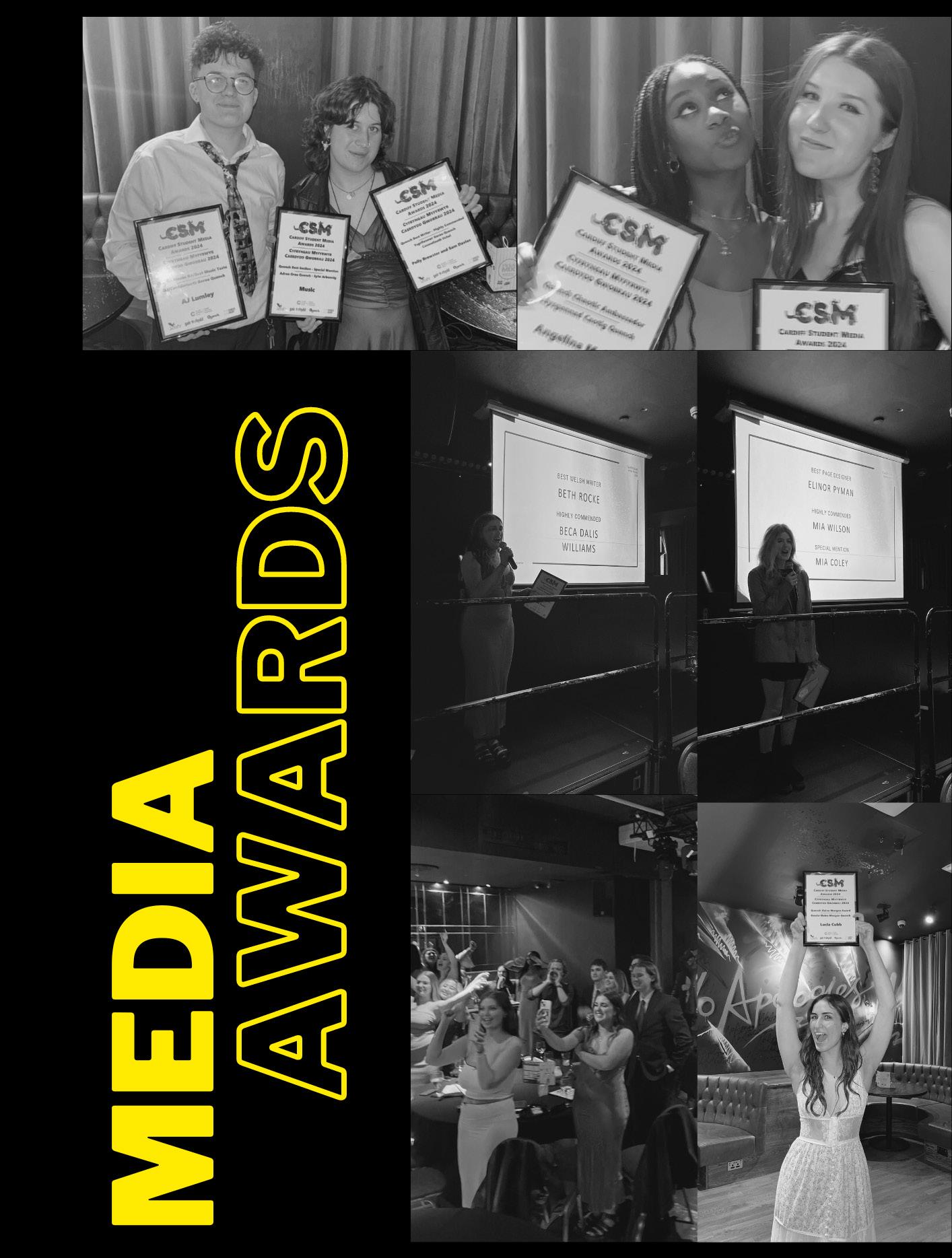
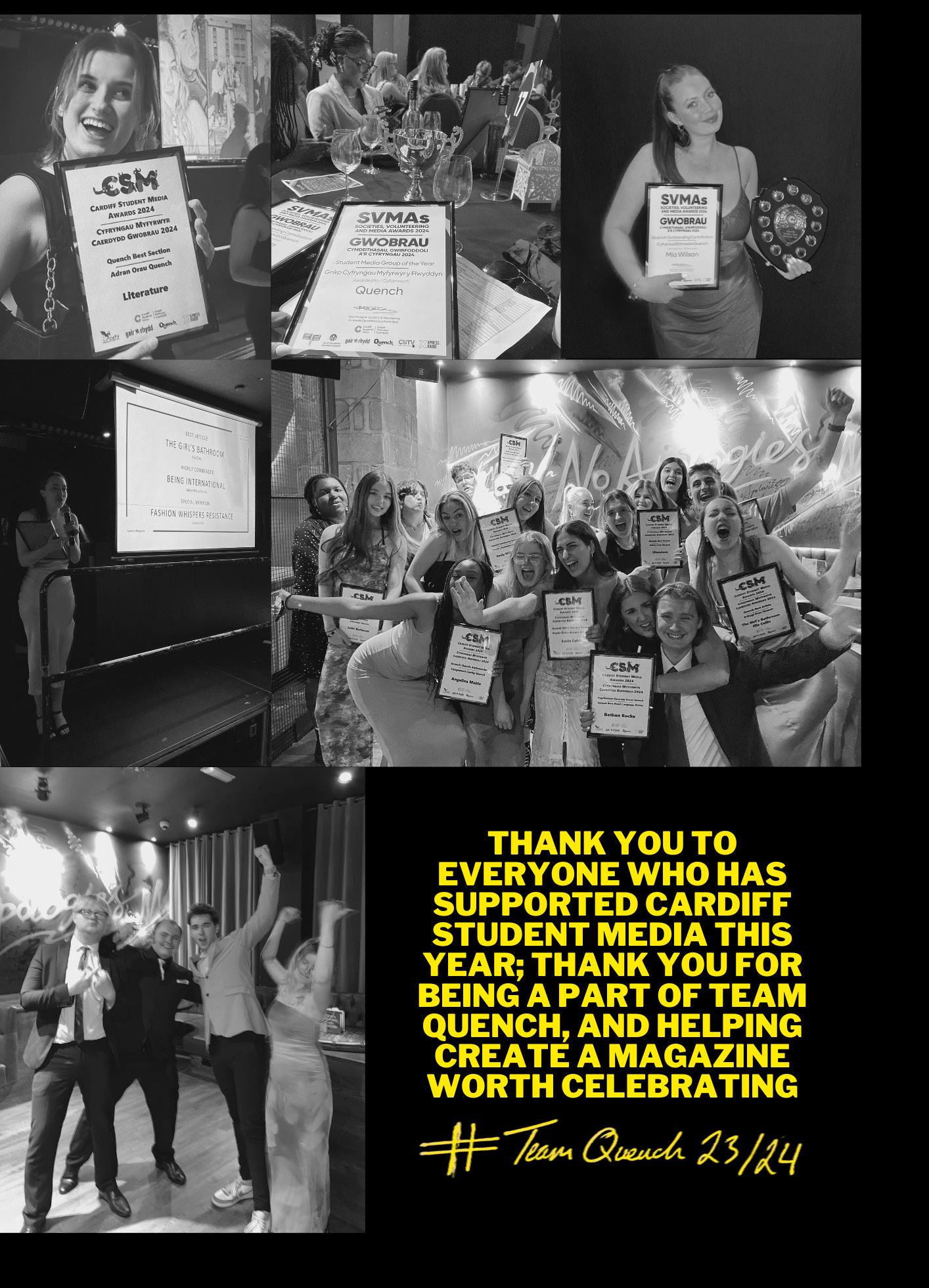


We’ve all heard people boast about giving their partners multiple orgasms during sex and how great of a partner this makes them, but when did the prime quantifier of good sex become how many times someone can come?
The orgasm is a unique experience for everybody of all genders, with some people finding the release easy to come to, and some people never finding it at all. So, when, and more importantly why, has it become the be-all and end-all event, which looms over any sexual activity, whilst potentially tainting the intimacy which is being built?
While it is undeniable that an orgasm is a rewarding experience and the hormones released are known to decrease stress and create a sort of euphoria, going into sexual activity with an end goal in mind defeats the whole point. It is supposed to be an enjoyable experience where

you can relax and be vulnerable. It’s been proven that the stress and anxiety felt by many to reach orgasm is one of the main reasons they struggle, resulting in a feeling of unfounded inadequacy and guilt.
Historically, sex and specifically pornography has been centred around the male orgasm and the end of sexual activity is almost always defined by the male release, placing female pleasure almost as an afterthought. In recent years, there has been a shift as more people are emphasizing the female orgasm. This, however, places pressure on women everywhere who feel the need to perform and even fake orgasms to save potential embarrassment from their partner. All of this could be avoided by simply enjoying the act without the pressure of feeling like an orgasm has to be achieved by everybody involved.
Furthermore, drilling in the message that the end of sexual activity is the male orgasm can put a lot of pressure on men as well. This makes them feel like they must achieve this goal to have “successful” sex and live up to “being a man”. To further complicate things, there’s pressure on men both to not come too soon and not to come too late, which causes a lot of anxiety and further takes away from the space for enjoyment. This is made worse by the rapid increase of people sharing content on social media platforms such as TikTok, making fun of people for not measuring up to these arbitrary social standards. Content like this will make those watching feel insecure and stressed out about engaging in sexual activity, due to the pressure to give the perfect performance to their partner.
An absence of orgasm doesn’t have to mean an absence of pleasure. There are many factors which can affect a
person’s ability to orgasm including, but not limited to, medical procedures, medication, and anxiety. Therefore, perpetuating this harmful expectation that a sexual activity is only successful if it ends in an orgasm, creates unnecessary shame and a sense of inadequacy for everyone involved. Being vulnerable with your partner and enjoying sexual activity with your partner (s) can build strong emotional bonds.
If we stop rushing to the destination, we can enjoy the journey more.
words by: Alice Roach design by: Alanya Smith

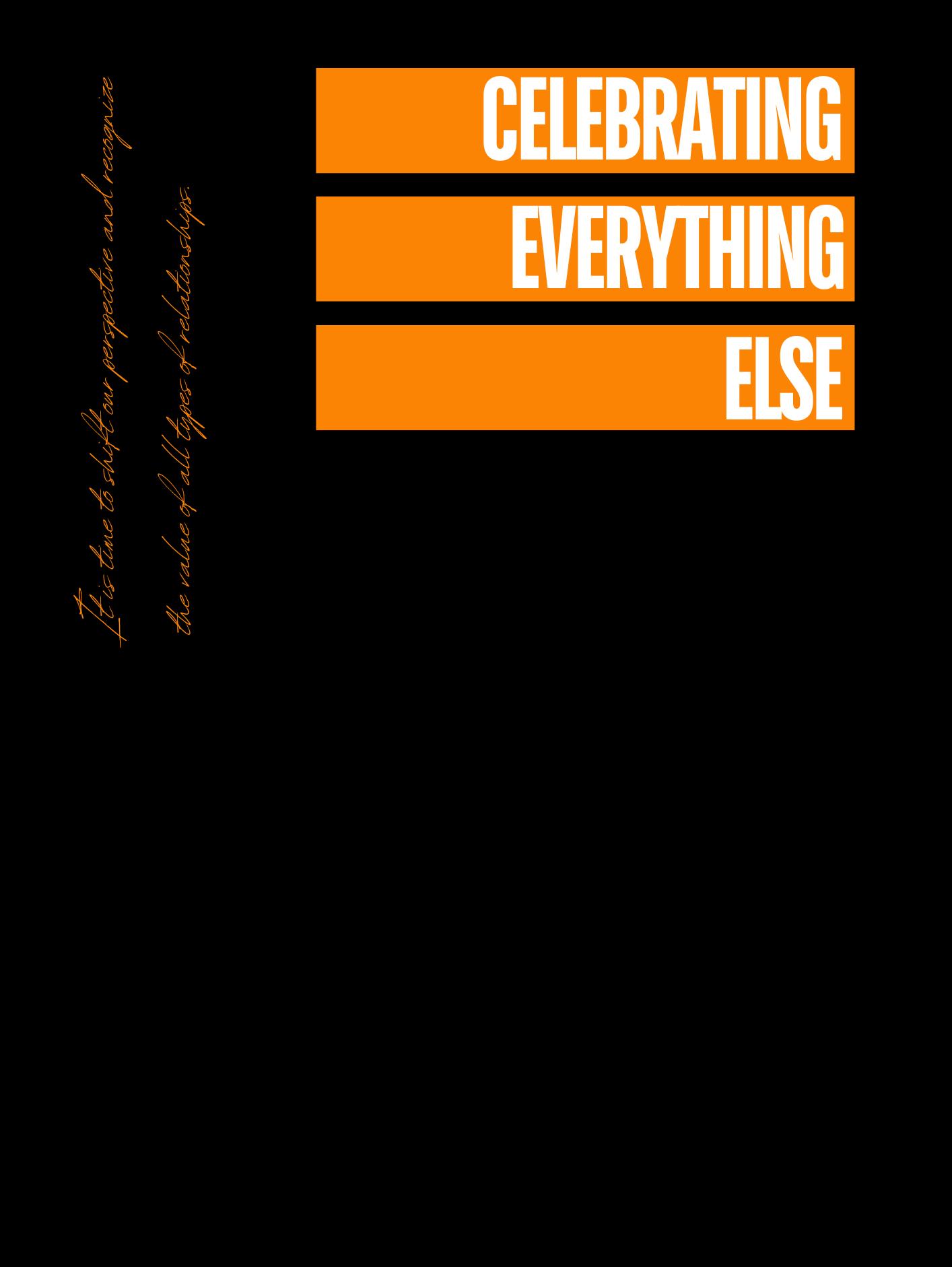
Human relationships are complex, and each one is unique – yet we often focus solely on romantic ones. As we grow up, movies and media make us think romance is essential and significant to make us whole, so our teenage years are dominated by the search for and definition of romance. Throughout life, we encounter so many different people, each encounter with the potential to develop into something bigger. Whether it’s a strong friendship, a good work buddy, the changing bond we grow with our parents, or even just mutual respect with someone we know, every connection we make adds richness and variety to our lives. Whether these relationships were born out of serendipity or nurtured through shared efforts, they become our support system, our inspiration, and our sources of happiness.
Take, for instance, the enduring bond of friendship that often surpasses time and distance. Defined by shared laughter, heartfelt conversations, and mutual support through our ups and downs. They are the ones we turn to for advice, the ones who stand by us during our darkest hours and the ones with whom we create memories that last a lifetime.
Similarly, the camaraderie we share with colleagues in the workplace can be a source of motivation, inspiration, and professional growth. From collaboration to the celebration of shared success, these connections foster a sense of belonging and teamwork that enhances our productivity and satisfaction in our careers.
Our relationships with family members, too, are the foundations of our lives. The attachments between parents, siblings and extended family members provide unparalleled support. Built on a base of unconditioned love, trust, and
shared experience, these people shape our identities and values from early on.
Even casual acquaintanceships, characterised by occasional interactions, contribute to the variety of our social life. Whether it’s the neighbour who lends a helping hand or the person we exchange friendly greetings with, these connections remind us of the interconnectedness of humanity and the importance of kindness and civility in our daily interactions.
Despite the undeniable significance of non-romantic relationships in our lives, they often go unacknowledged and underappreciated in comparison to romantic partnerships. While we lavish attention and affection on our romantic partners, we may overlook the profound impact that our friendships, familial ties, and other relationships have on our happiness and well-being.
It is time to shift our perspective and recognize the value of all types of relationships. Just as we commemorate anniversaries and milestones in romantic relationships, we can create rituals and traditions to celebrate the meaningful connection we share with others. Whether it is hosting a gathering, spending valuable quality time, a thoughtful present or a heartfelt letter, these gestures of appreciation serve to strengthen our bonds and show a sense of gratitude and belonging.
Embracing the diversity of our interpersonal connections beyond romantic relationships ultimately leads to cultivating a community that enhances our collective well-being.
So, if reading this got you thinking about someone special you appreciate, why not shoot them a quick message?
words by: Liliana-Louisa Seidel design by: Alanya Smith
concocted to measure human worth by when, howandwith
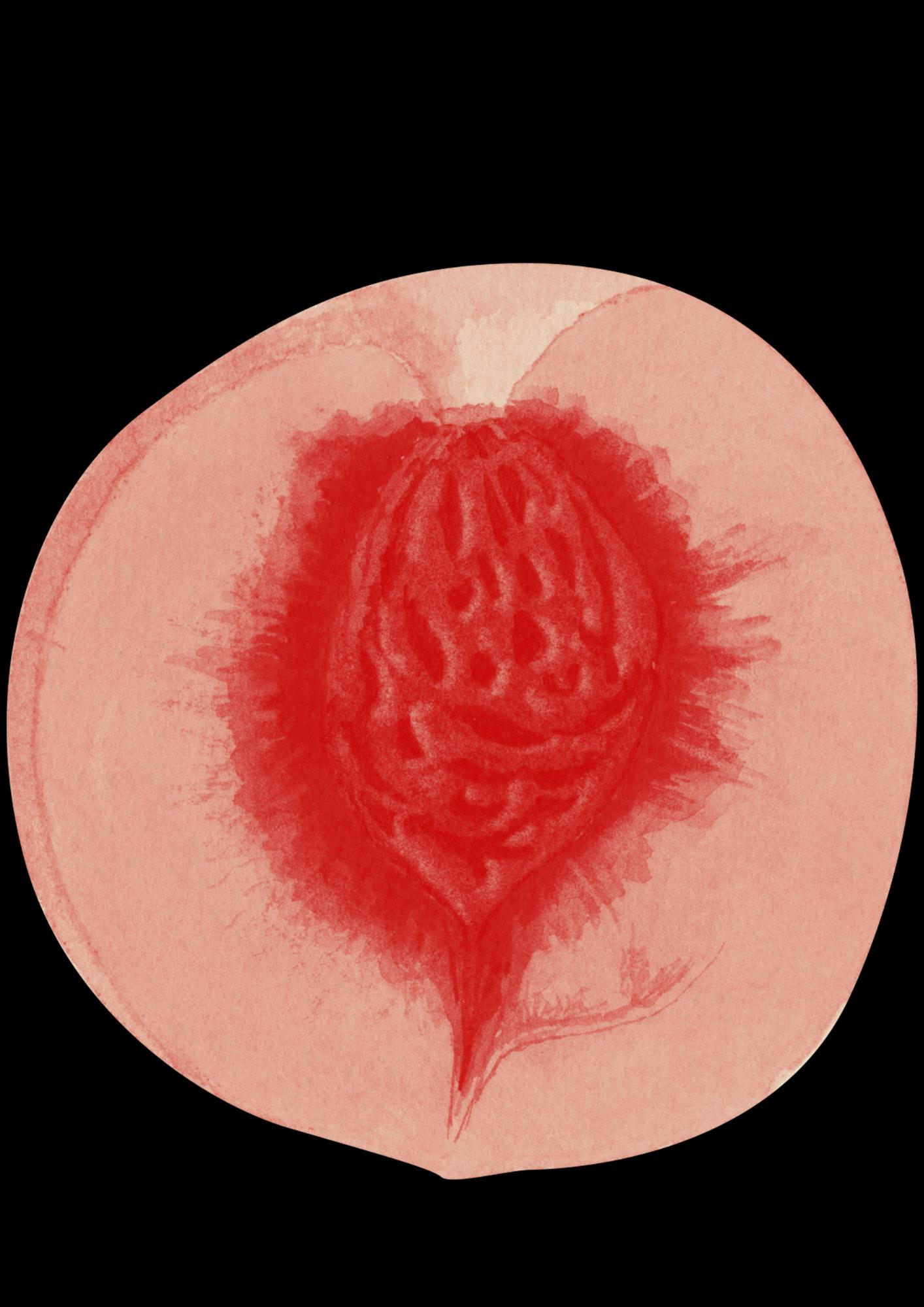
There’s something eerily medieval about modern society’s continued obsession with losing your virginity. An entirely manmade social construct concocted to measure human worth by when, how and with whom they chose to engage in sexual activity for the first time. Yet in modern society, being a virgin has gone from something of a prized possession to a dunce-like hat of shame.
I never experienced the rush, or the need, to indulge in sexual activity from a young age. For a long time, I thought I was asexual. The primal urge just wasn’t there – or so I thought – turns out that despite liking both genders, I simply found very few people attractive.
Point of view: You’re me, minding my own business in Year 9 science class, when I overhear one of my classmates talking about how she was going to ‘treat’ her boyfriend for his 15th birthday. The mention of it made me want to die,
not only out of second-hand embarrassment and shock but also the inner knowledge that I was still too scared to insert a tampon.
A few years down the road, having been diagnosed with vaginismus, I more than pretty much anyone know that there is no shame about the where and the when. Many people preferred to get it over with, whilst others believe in chastity until they find the one. The only opinion I have, is that however you choose to do it, it is entirely your personal choice. Nobody but you, gets to decide when and how you have sex, least of all society at large.
If anyone tries, screw them (but only if you want to, of course).
words by: Tegan Davies design by: Alanya Smith
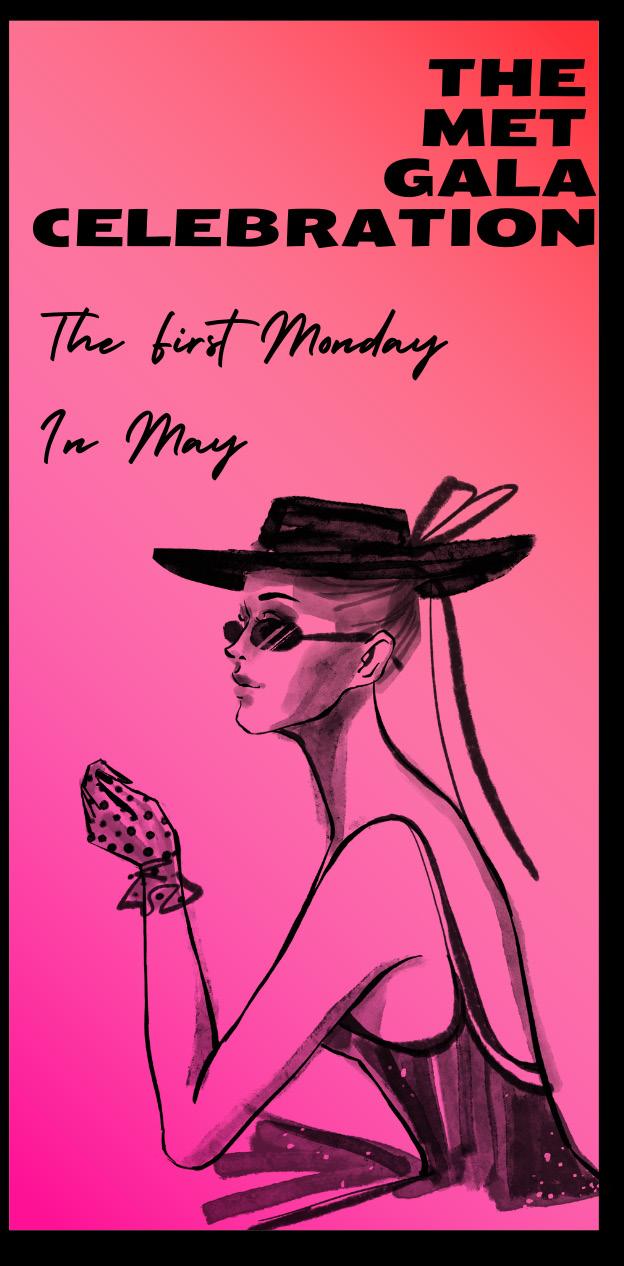
The 2024 Met Gala will take place on Monday 6th May in New York, celebrating the opening of the Costume Institute’s annual exhibition ‘Sleeping Beauties: Re-Awakening Fashion’. The dress code for this year’s event will be ‘The Garden in Time’, inspired by JG Ballard’s short story of the same name.
Formally known as the Costume Institute Gala or the Met Ball,
The Met Gala is an annual fundraising event for the benefit of the Metropolitan Museum of Art’s Costume Institute in New York City. The event traces its origins back to 1948 when publicist Eleanor Lambert organised the first-ever Costume Institute Benefit at the Waldorf-Astoria Hotel to encourage donations to the newly founded Costume Institute.
Over the years, the Met Gala has evolved into one of the most prominent and star-studded events in the fashion calendar,
attracting celebrities, designers and influential figures from various industries. Each year, the Gala revolves around a specific theme corresponding to the Costume Institute’s exhibition, inviting attendees to interpret it creatively through their fashion choices.
Ticket prices for the Gala are reportedly sky-high, with individual tickets costing tens of thousands of dollars and tables costing hundreds of thousands of dollars. Additionally, many guests make substantial donations during the event. While it’s difficult to pinpoint an exact figure for how much the Met Gala is worth, Vogue Business reported that the 2023 Gala “raised almost $22 million — another record for the event”, with WWD reporting that “The Met Gala generated nearly $1 billion in media impact value”.
With an event of such a scale, a little controversy is to be expected. The Gala provides a platform for an endless sleuth of media content including global news coverage and X (Twitter) memes.
Perhaps the most controversial moment in Met Gala history goes to Kim Kardashian, who wore Marilyn Monroe’s “Happy Birthday, Mr. President” dress from 1962 to the 2022 event. After speculation online, Kardashian stepped onto the carpet in the extremely delicate piece pulled from Ripley’s Museum.
Kim wore the real dress for just a few minutes on the red carpet and changed into a replica before entering the actual event. Her laborious efforts to wear the dress for less than 15 minutes certainly didn’t go unnoticed, with the internet questioning whether it was even necessary. To fit into Marilyn’s dress Kim went through some questionable weight loss measures, which she nonchalantly boasted about on the carpet.
The true impact of the Met Gala is multifaceted and subjective. While it serves as a powerful platform for celebrating creativity and showcasing the artistry of fashion, it can perpetuate unrealistic beauty standards and consumerism, potentially contributing to societal pressures and inequalities.
The Gala’s extravagant displays of wealth and glamour can reinforce exclusivity and elitism, alienating those who don’t conform to traditional beauty norms. The event’s emphasis on opulence and celebrity culture can also fuel materialistic values, promoting a distorted perception of success and selfworth.
Ultimately, the true impact of the Met Gala is nuanced and open to interpretation. While it undoubtedly serves as a beacon of creativity, it’s essential to critically examine its implications and strive for inclusivity, diversity and authenticity within the fashion industry and society at large.
words by: Olivia Griffin design by: Alanya SmithWith the hopeful prospect of exam season ending and brighter, warmer days in Cardiff soon approaching, I have come to your rescue to suggest some fun things to do in Cardiff to celebrate the end of the year! Many of you may be feeling burnt out from the stress of exam season, busy libraries, and late nights, but with summer fast approaching, we’re all looking for the perfect ways to spend our well-deserved break.
1) Waterfalls walk in the Brecon Beacons –
Whether you are an avid hiker or love a stroll, this stunning waterfall walk is for you! Situated just over an hour from Cardiff, it’s the perfect hike on a summer’s day. You could bring a picnic to share with your friends and find the perfect spot for a dip too!
2) Picnics in Bute –
One of the perfect places to picnic is Bute Park. The largest park in the city, there is plenty of room to find the perfect space for an afternoon picnic. Bringing a ball, a book, or even a pack of cards is enough to keep you entertained!
3) Paddleboarding in the bay –Now, this one is for all you water babies! Whether you have a paddleboard or hire one, the bay is a great place to get out on the water. Normally calm and flat, it’s the best spot around for water sports. I will definitely be doing this summer!
4) Watching Cardiff Rugby in the arms park –
As a huge rugby fan myself, there is usually an opportunity to watch Cardiff Rugby in the city this year. With the stadium in the centre of town, you can wear your best outfit and cheer on Cardiff at one of their final games of the season! It’s something you should check off your to-do list after your exams. So sit back, grab a pint, and enjoy the match!
5) Pottery painting at Peggys Pots –
I find that pottery painting is always a relaxing and therapeutic activity to do with a group of friends or even in a pair. Peggy’s Pots have a huge range of pottery ready for you to paint, from mugs to picture frames. They even offer a takeaway painting kit that you can do at home, and you can bring the finished product back to the lovely staff for glazing and get it ready in just two weeks!
6) Treat yourself to some yummy pasta at Cardiff Market’s Dirty Gnocchi –
With many vendors in the Cardiff city market, Dirty Gnocchi is one you need to try! Their famous cheese wheel pasta is truly something that’ll get your tastebuds tingling. Located upstairs in the market, you can enjoy some great pasta and people watch simultaneously! What’s more to like?
7) Drinks at Gin & Juice –
This is one of the coolest bars in the city, Gin and Juice. In the castle arcade, the bar owns some of the other businesses in the arcade, so why not make a night of it? With some of the best cocktails in the city and live jazz music on a Friday, it’s the best place to start the celebrations of finally finishing your studies.
8) A hike up Pen Y Fan –
Again, if you love hiking, then this is for you! One of the famous hikes around the area is Pen Y Fan. After a long climb, it’s definitely a sight at the top, and that’s a celebration in itself!
9) Go for brunch at Cardiff Bay –
Two words: bottomless brunch…
10) Cardiff Aqua ParkFinally, an inflatable assault course on the water is something you should do at least once! Naturally, who would want to pass the opportunity to push your friend into the water? It’s a great way to end the year; you’ll sleep well after, too!
Words by Amelia Wollacott

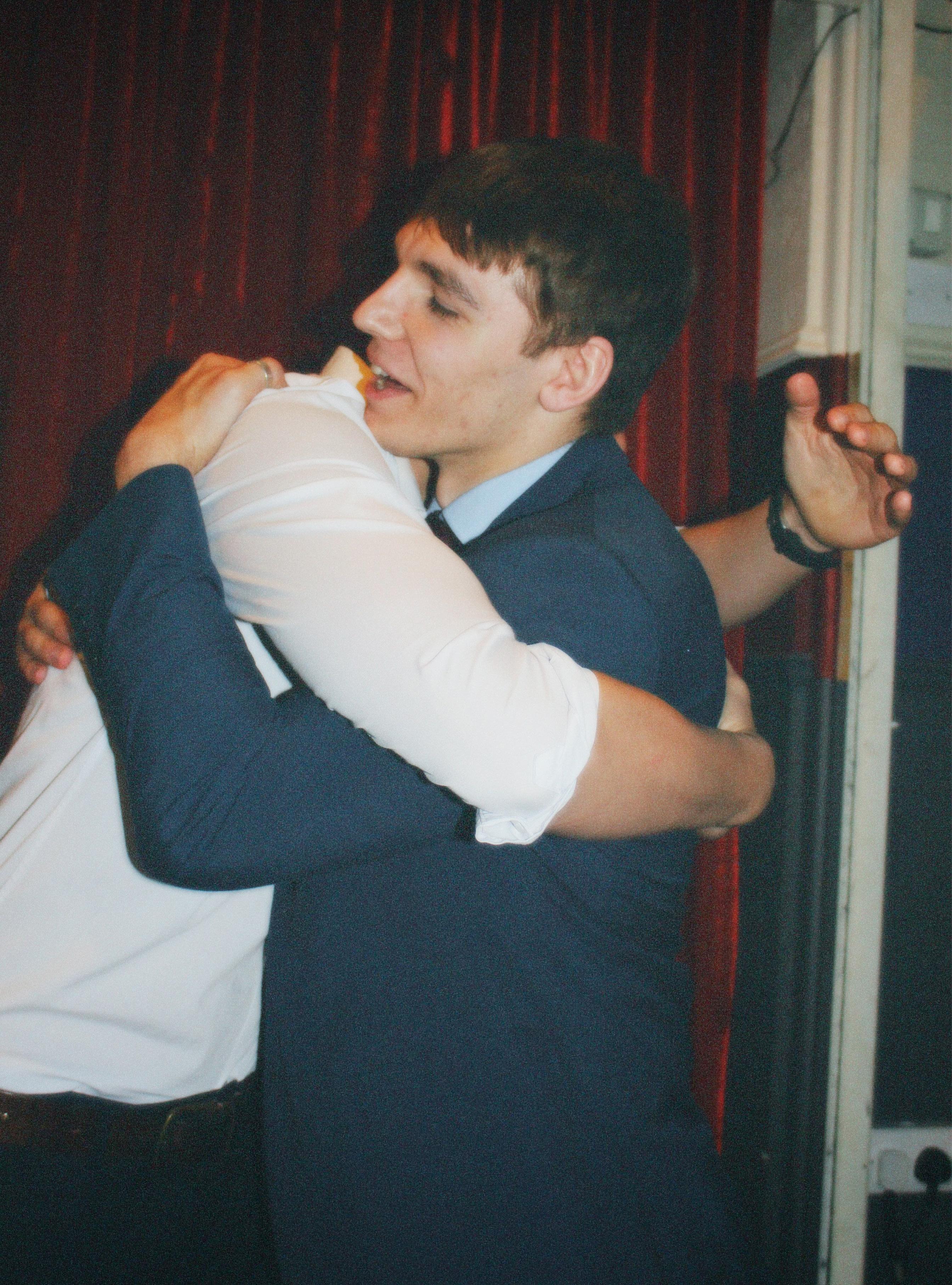
 photography by: Mia Wilson
photography by: Mia Wilson

Graduation. It’s a word that carries a weight of emotions, expectations, and perhaps already a string of memories. When it comes up, it’s like a doorway to a flood of thoughts and images. But let’s be real – it’s not all like a scene from a movie, no matter how much we wish it were. My own experiences with graduation have been a mix of excitement, disappointment, and everything in between. I’ve had the privilege of celebrating two graduations, and while they weren’t exactly “High School Musical” material, they were significant milestones in my life journey. However, looking back at there are a few things I wish I had known or done differently to enhance my graduation experience.
Here are some top tips for making the most of your graduation day:
university, yet I’ve already caught myself daydreaming about that moment when I’ll finally hold my certification in hand. It’s a vision that helps me push through the tough assignments and late nights. There’s a sense of pride in knowing that I’m working towards something significant, something that’ll mark the end of this chapter of my life.
Yet, amidst the excitement, there’s also a fair share of stress. As the first person in my family to attend university, the weight of expectations can feel overwhelming at times. I know my parents are eagerly awaiting the day I walk across that stage, but what if I don’t meet their expectations? What if my grades aren’t as stellar as I hope? What if I don’t meet my own expectations? These doubts can creep in, casting a shadow over the joyous occasion.

Amidst the chaos and excitement, take time to pause and truly soak in the significance of the occasion. Reflect on your journey and celebrate your accomplishments with gratitude.
Despite careful planning, unexpected glitches may arise on graduation day. Embrace the unpredictability with a sense of humour and adaptability.
Graduation is a time for celebrating together with friends and classmates. Try to connect with those who have shared in your academic journey, creating lasting memories.
For me, graduation is more than just a single day or a ceremony. It’s a whole process – from finding the perfect outfit to pre-celebrating with friends, and maybe dealing with a bit of post-regret the morning after. It’s a culmination of years of hard work and camaraderie, and it’s something worth cherishing.
But even before the big day arrives, the anticipation of graduation can be a driving force. I’m only in my first year of
And then there’s the looming question of what comes next. University life, with its lectures and late-night study sessions, can feel like a bubble of protection from the harsh realities of the world. But eventually, that bubble will burst, and we’ll have to face the challenges of real adulthood head-on. Finding a permanent job, starting a career – it’s a daunting prospect to say the least. Graduating from University is a bittersweet ending with a whole cocktail of emotions.
But despite the uncertainties, there’s also a sense of excitement for the future. Graduation marks not just the end of an era, but the beginning of a new chapter. It’s a chance to spread our wings and see where life takes us. It’s also a chance to reflect on us and the growth we went through. All the memories we have created and all the obstacles we overcame while learning something new and building our personalities. So, while the road ahead may be uncertain, we are ready to embrace whatever comes my way, knowing that we have got the knowledge and skills to tackle whatever challenges lie ahead. Graduation may be just a word, but it represents so much more – it’s a celebration of hard work, perseverance, and the promise of a bright future.
words by: Liliana-Louisa Seidel design by: Alanya SmithWe sat down with Micaela, Cardiff Students Union’s VP Postgraduate, to hear her thoughts about the PG community at Cardiff and her plans for the next academic year.

Can you tell us a bit about yourself and your background as VP Postgraduate at Cardiff University?
I’m Micaela, I’ve been a student at Cardiff University since 2015, that’s when I started my undergraduate here – I did it in BA History, and then I went straight into my master’s in History as well. I then took a couple of years off during COVID and then came back to do my PHD. So I’ve been a long time Cardiff student – seen it all, I remember the old steps! For my PhD – I’m looking at political women’s history in the 20th century. I then decided to run for VP Postgraduate about two years into the PhD just because over time I noticed that the support available for students weakened as time went on – as you moved from an undergraduate to a postgraduate taught to a postgraduate research it seems to get less and less, or at least less obvious, especially for PhD students. It’s not amazing at the university, so I got really frustrated and annoyed and I was like, yeah, I’m gonna run in this year’s elections. I had run previously – I was unsuccessful when I was a master’ student, I went for VP Education, but looking back I’m quite glad I lost that election because I never would’ve had the chance for this one. So yeah, I ran out frustration, I think. I wanted to make things better and there had never been a PhD in this role before which I also found frustrating.
In what ways do you think the postgraduate experience at our university differs from that of undergraduate students?
I think there’s a couple of different ways in how it differs: it’s different for a PGT, so like a master’s student, and then it’s again different for a PGR, so postgraduate research or PhD students. I think the main difference is the independence you have going from an undergraduate to a postgraduate course. Again, that difference depends on what discipline you’re in – if you’re doing a STEM subject you’ll have so much more contact time, than you would a humanities
or an arts student naturally – which is kind of the same in an undergraduate anyway. But I think the independence level [differs most], and that runs through both taught and research degrees. But I think the biggest difference, if you’re looking at a postgraduate research and an undergraduate is that you’re almost staff at that point – so you’re still a student but you’re also staff sometimes if you’re teaching and it’s a weird world to navigate because the university doesn’t know how to treat you.
What do you believe are the biggest strengths of our university’s postgraduate community?
Actually, the postgraduate community at Cardiff, I’d say, struggles. Surveys conducted by the university always show that there is a low sense of community amongst postgraduate students which is really sad. But you can kind of see why in terms of less contact time. If you’re a research student it’s very isolating and independent – you get a bit more sense of a community as a taught student I think. If you look from the outside at the Student’s Union, it looks very undergraduate focused. But the strengths – there’s some really good examples of postgraduates forming their own communities rather than one big postgraduate community, which unfortunately, like I said, there’s a strain there, but you see postgraduates making their own little communities through coming together to put on seminar series, or I know some people, when they researching together or studying together or getting stressed, will go out for a walk. You see people doing that on their own, but we need more support for them to do it because there’s lots of good practice but it’s sparse.
As VP Postgraduate, what do you see as your primary responsibilities in advocating for postgraduate students’ interests and concerns? Can you tell us more about your recent campaign?



So the VP Postgrad role is an interesting one because it’s 50-50 – taught and research – and it’s been really lucky that we’ve had a VP Undergrad, and a lot of the taught elements kind of fizz over into postgraduate taught as well, so you know that’s safely covered and then I’ll deal with the more niche postgraduate taught master’s issues. I’d say up until this point the majority of the work I’ve been doing and previously that other VP Postgrad’s had been doing has been for postgrad research because that just seems to be where most of the issues are. I think my main responsibilities have been to look after the academic interests of those students: ensuring that they’ve got the resources they need or know how to get the resources they need as a student; that they’re getting adequate supervision; looking after welfare needs and ensuring that student support is available. That’s where the community element feeds in as well and bridges across.
How would you assess the current availability and accessibility of support services and resources for postgraduate students at our university?
Something I think I’d really like to get across is 9 times out of 10 the support is there, whether it’s financial support through the hardship fund, well-being services, or the support you find in the CSL – it is there for postgraduates, but a lot of the time postgrads don’t feel that they can access it because the shop window looks very undergraduate. The communications that they send out are tailored to undergraduate students because that’s the majority of students at Cardiff University. I’ve met a lot of postgrads who feel like they can’t access it because they don’t feel like it’s for them. So I think that’s one thing that I’d like to get out – it is there, it is available for them, so please use it even if you’re a bit tentative if it’s for you or not because they’ll just tell you whether it is or isn’t.
Are there any specific areas where you believe additional support or resources are needed for postgraduates?
Bursaries are something that I’ve been fighting for this year. I wouldn’t say there’s a lot, but there are a few bursaries available for undergrads, for example the Cardiff Award, where students from low-income backgrounds can apply. There are awards through something called ‘Together for Cardiff’ – up until this year they weren’t available to any postgrads, but now they’re available to postgrad taught students, but I’d like to see that extended as well because one of the biggest barriers for people actually going on to do postgraduate study would be financial burdens. There’s also something called The Alternative Guide to Postgraduate Funding which you can access through your student login on the Intranet – it’s an external provider – the majority of them are on there are for postgrad research but there are some master’s-based bursaries on there as well, including funding from charities.
What are your long-term goals for enhancing the postgraduate experience at our university?
An overall stronger and more consistent graduate community
across the university is something I’d like to see by the end of my second term. Ensuring that postgrads who teach actually have rights benefits that we won back last year and they’re actually being implemented properly across all schools – improving the contracts is also a goal, so ensuring working conditions get better, and pay is better. Going back to both academic and student support, I’d like to see, like I said before, the university tailoring things to postgraduate students: making things that might not have been accessible to postgrads more accessible to postgrads, support for supervisors so they’re able to deal with or know how to support students who are perhaps international or have a disability, as well as a mechanism that if students have issues with supervisors they can report it without feeling uncomfortable.
What legacy would you like to leave behind as VP Postgraduate Representative?
I’d like to see another postgraduate research student in the role because the majority of the stuff that this role deals with is research-based, PGR, based issues. I hope I’ve shown people that the role is successful.
Legacy for myself – that’s really tough! Looking back at those in my role before me - Angie’s legacy was being very approachable and friendly and welcoming. Orla was very policy driven and wanted to get things done. I think I’d like a mixture of the two – she got it done and she got it right but she was also nice and supported us.
Finally, with graduation approaching, many postgraduate students are looking forward to celebrating their achievements. What role do you see yourself playing in ensuring that the graduation celebration is inclusive and meaningful for all students, especially given the diverse backgrounds and experiences within the postgraduate community?
In terms of graduation itself and how it is run, I don’t have that much of a say, the university does almost all of it. But I do have some control over a speech to give at graduation – I’d like that speech to make everyone in the graduation hall to feel like there’s a piece of them in it. We were looking over last year’s, there were a lot of references to when students arrived at their hall of residence – but not everyone, especially postgrads, don’t arrive at halls of residence. There’s lots of parts like that in previous speeches that I would like to update and amend the wording. I want to make it inclusive and acknowledge a little bit of everyone – it’s going to be very cheesy!
interview by: Lucia Cubb design by: Alanya Smith

 photography by: Adam Breen
photography by: Adam Breen
